AM NDMENT
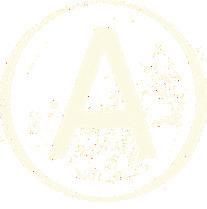
SOCIAL PROGRESSION THROUGH ARTISTIC EXPRESSION
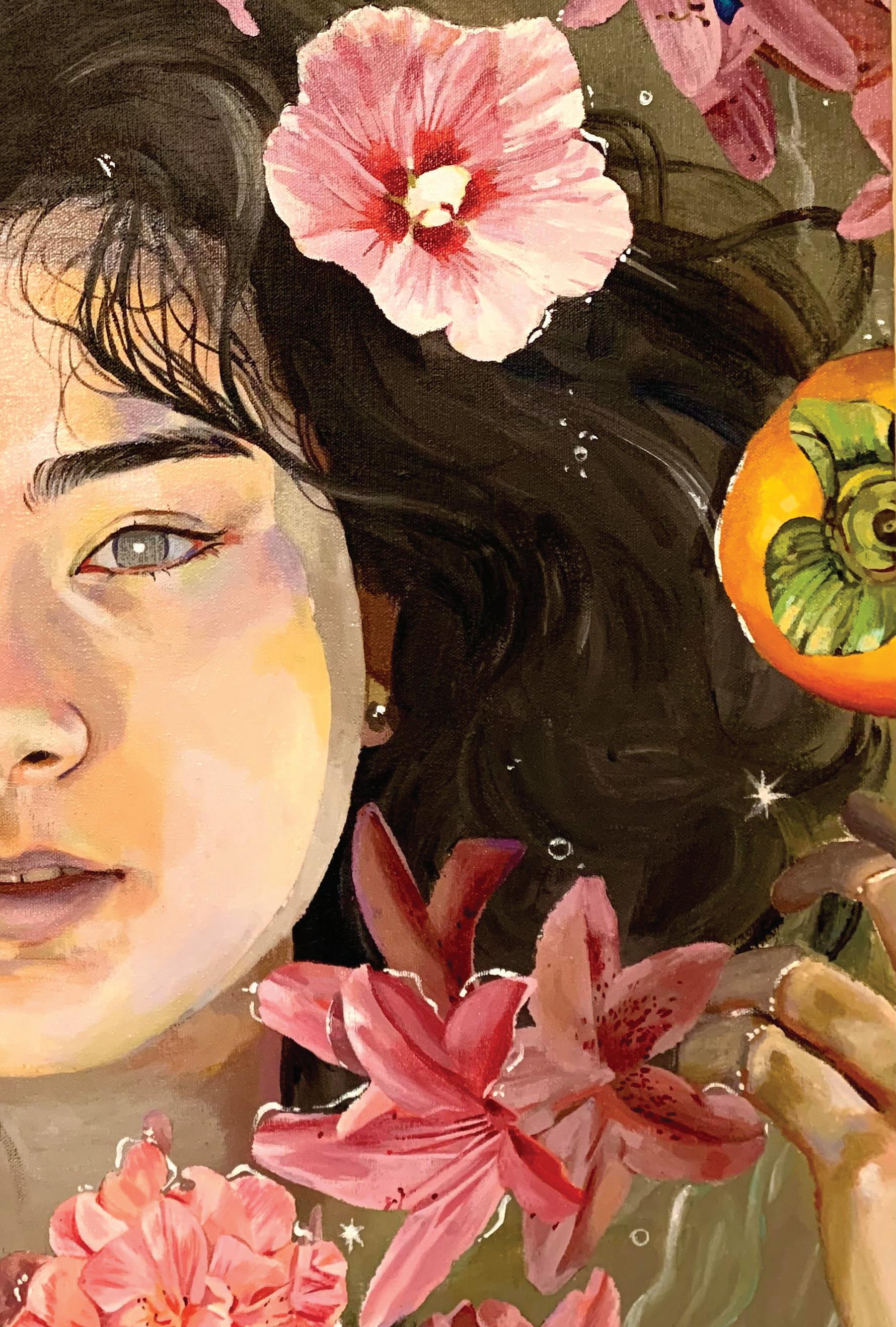
Literary and Art Journal 2022
E
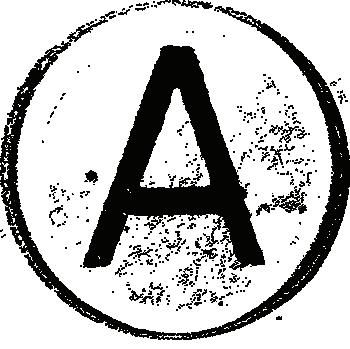
About the Cover
The River
Hyunji
da Silva
Every person of color living in America has been asked where they’re really from at one point in their life, emphasizing their “exotic” features, their Otherness. ose born in the U.S. feel this to an extreme level, wondering what about themselves is not American enough. Paintings like “ e River” are about the reemergence of a cultural identity a er a lifetime of not belonging. e main gure is dead, but the owers and plants around them are blooming again, symbols of their re-emerging identity. It also references famous Western art around the character of Ophelia in the play “Hamlet.” A person with an Ophelia complex has no identity, no sense of self or soul. e gure in the painting is in that stage, but will soon blossom into a new life, a rebirth.
Staff
Ally Awtry
Ashley Barnhill
Abby Bressette
Benji Foster
Diana Ho
Jordan Kalafut
Elysia Lin
Maddie Martin
Haley Salmen
Annabelle Starr
Katie ompson
Noah Vickers
Varsha Vasudevan
Editor-in-Chief
Lead Designer
Designer
Literary Editor
Student Media Center Director
Art Editor
Creative Media Manager
Social Media Manager
Business Manager
Syd Lewin
Madison Tran
Tess Wladar
Rachel Poulter-Martinez
Jessica Clary
Viv Rathfon
Mark Je ries
Gracie Trice
Owen Martin
Amendment Staff
amendment 1.
Mission
/ə’men(d)mənt/
An annual publication of radical student-made visual and literary storytelling. We foreground works of hope, joy, healing, resistance, hard truths, imagination, lived experience, and ideas about how we change this world for the better.
2. 3.
A student-run creative collective ghting for change at the intersection of art, writing, and accessible knowledge.
What you’re holding in your hands.
Acknowledgements
Amendment would not be possible without the passion and dedication of countless people across VCU.
To our sta : each of you brings a unique, compassionate perspective to this publication that strengthens our mission and lls our Friday a ernoons with joy and thought-provoking discussions.
To our Editors: Gracie Trice, Social Media Manager, you fearlessly dove into the deep end this semester and we value your work. Viv Rathfon, Art Editor, you lead with patience and an artist’s eye. Your skill as an artist and an editor is aweinspiring. To Syd Lewin, Editor in Chief, you have guided this group to be the best version of itself and drive us to ght for the better world we advocate for in the pages of this book. You are strong, kind, brilliant, and erce.
To the SMC Sta : Jessica Clary, Mark Je ries, and Owen Martin, your tireless e orts and guidance allows a room full of artists, activists, and authors to create something incredible, like this book.
To our designers: Madison Tran and Tess Wladar, you made this book as beautiful as it is with your time and skill.
To our contributors: we would not have a book without your work and your trust. It is the greatest honor to o er a home for your voice and your perspective.
To you, the reader: thank you for picking up this book. We hope you nd something in these pages that challenges you, excites you, makes you feel seen, or just makes you smile.
Rachel Poulter-Martinez Literary Editor
Literary journals, like all things, evolve. I have been here for four of Amendment’s 18 years, which is simultaneously a very long time and a very short one.
If you’ve read our books before, you might have noticed our mission statement has changed some. is was one of my rst proposals when I ran for Editor in Chief, because it hadn’t been updated since 2010 and a lot of other things have changed since then.
It’s also, frankly, because it didn’t feel like our statement—sure, we could go through and check o all the things mentioned in it, and they were objectively good ones: providing a platform, advocating for social change, promoting discussion. And yet, it felt lukewarm. Our Art Editor, Viv, described it as having a hollowness to it—”not enough love.”
And really, that’s what’s kept me around for four years. Love, care, excitement, messy discussions, dissenting opinions, the whole o -cited shebang. (I know that our Literary Editor, Rachel, is handling the acknowledgments, but it wouldn’t be right not to include my own intense gratitude for everyone here.)
So we met up and brainstormed, collaborated, agreed, disagreed, and nally rewrote the statement.
We talked a lot about being understandable. A lot of theories of social change are just that—theoretical. And while it’s certainly important to read and learn, that can be a daunting rst task. So we are basing our work in lived experience, and growing from there. Come as you are, learn as you go.
ere was also a lot of talk about the personal and the political. e work of publishing these stories is more than simply sharing a personal narrative—it’s about how personal narrative shows us that experiences of oppression are not an individual problem. ey are a collective problem, and therefore, have a collective solution. Not one of climbing some ladder, but breaking down both the ladder itself and the idea that we ever needed a ladder in the rst place.
is is my hope for Amendment, then. at we will publish work reminding us all that power is found in solidarity across our lived experiences. I want work that is angry, work that is joyful, work that is messy, work that makes us ask if we can even publish it. Most of all, I want work that pushes us to look at the world around us and imagine that things could be di erent.
Syd Lewin Editor-in-Chief
Letter from the Editor
Table of Contents Literature Featured Contributor: e Cookout shawn ........................................................................................ 11 Amendment Literature Award Winner My Power, Your Desire J.C. Hill 19 Re ections Anonymous ................................................................................... 24 CW: Suicidal Ideation, Mental Health Ant Farm Madeline Wade ............................................................................... 28 CW: Anxiety, Self Poisoning changeling children C. Pierson....................................................................... 38 A Portrait of Irony Madeline Bitzer 43 Untitled Artist: Judith Glantzman Madeline Bitzer ..................................... 44 CW: Child Abuse and Abandonment always drowning in ames Madeline Bitzer .................................................. 52 CW: Child Abuse inspiration is a jealousy Madeline Bitzer ....................................................... 56 CW: Child Abuse e Imagined Grave of a Gay Grandaughter Madeline Wade ...................... 61 Mary Solveig Reda ........................................................................................... 66 Pride (A Change is Gonna Come) shawn ..................................................... 68 Wild re Rebirth Kylie Lo ve Gatchalian......................................................... 73 Fire on Fire on Fire Jenn Bui .......................................................................... 76 As Necessary Beings ...................................................................................... 33 Motherland, 20 Years Postpartum ................................................................ 34 Protocol: Meditations on Care ..................................................................... 36 CW: Infant Death, Medical Racism Elysia Lin
Art Where Flowers Now Wilt LIGHTPAINTERR ............................................ 12 Amendment Art Award Winner Mother Teairrah Green 16 My Life Matters Too Alexzane Taylor ............................................................ 17 Red Iyana Graham........................................................................................... 18 Bodily Autonomy Sirena Pearl ...................................................................... 20 CW: Coat Hanger Imagery Wanda in Her Ermine Furs Andy Mazzella ................................................... 22 Stephanie Andy Mazzella 23 Fears Haley Salmen ......................................................................................... 27 Drought Abby Bressette ................................................................................... 39 Black Carbon Sirena Pearl ............................................................................. 40 A Future River Maja Olsson ........................................................................... 41 Vanilla Extract Maddie Martin ..................................................................... 42 Crybaby Amari Louviere ................................................................................. 51 Spot the Di erence Jesse Beck ......................................................................... 62 . Haley Salmen ................................................................................................. 64 Deviance LIGHTPAINTERR ........................................................................ 67 e River Hyunji da Silva ............................................................................... 74
i miss the days we spent sitting in the backyard, ice teas in hand while the adults held beer cans, and wine coolers, and the kids would run and splash around in the pool while the uncles in their friday night best, broken in sandals, jean shorts and all, would re up the grill with sausage, burgers, and ribs, cause the grill was where the men would show who was the alpha in the art of cooking, and the aunties would sit and gossip about who brought what while grandma tries to get the kids to eat their collard greens, mac and cheese, and sweet potatoes cause they won’t eat coleslaw or potato salad since they was too excited to sit still cause the music made them wanna get up and bust a move and all the adults would laugh and join in as the sun went down on the block and families would share their feast with those who couldn’t make it or were working too late, lord knows the man like to make folks miss a good meal.
i miss the days we spent dancing in the backyard.
11 Literary and Art Journal
The Cookout shawn
Amendment Literature Award Winner
Amendment Art Award Winner
Where Flowers Now Wilt
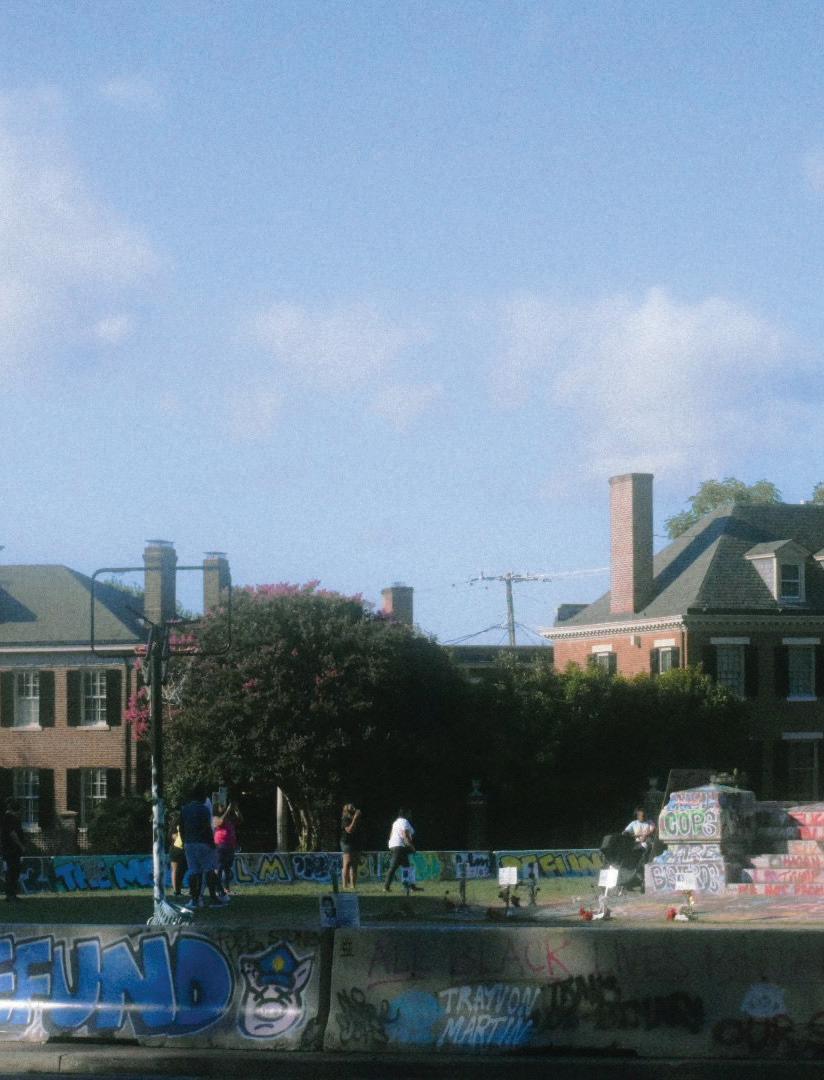
12 Amendment
LIGHTPAINTERR
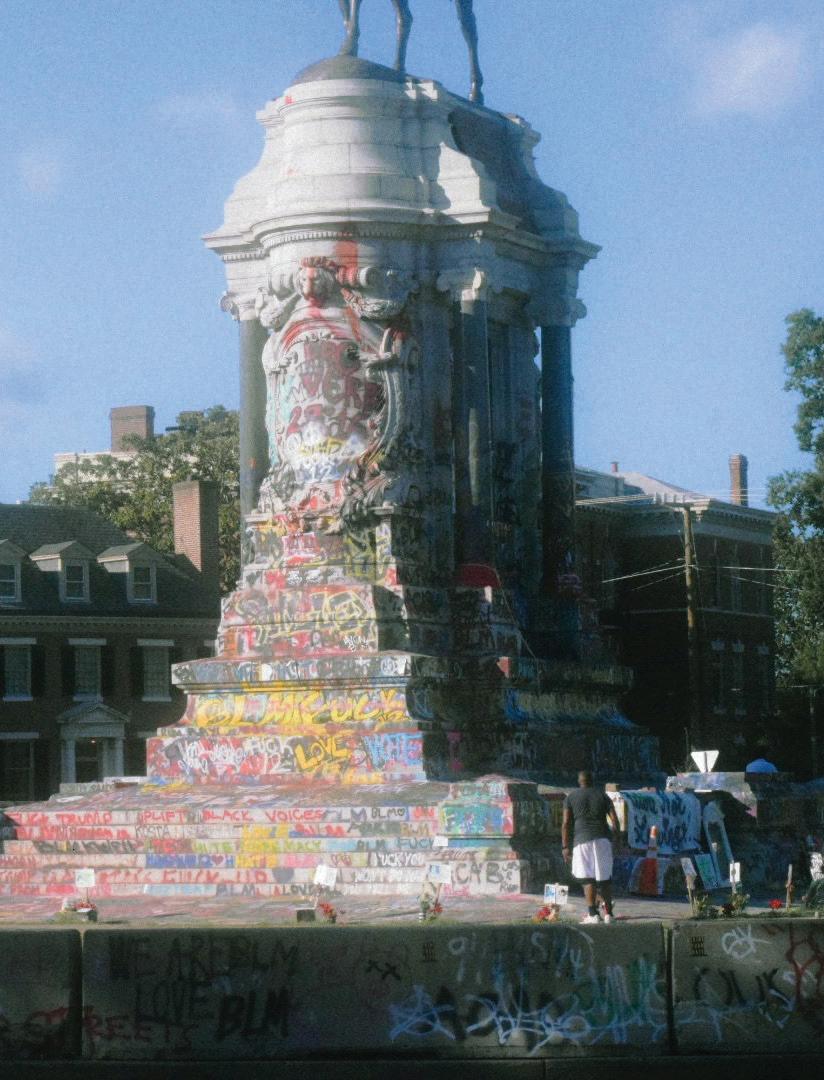
13 Literary and Art Journal
Amendment Art Award Winner
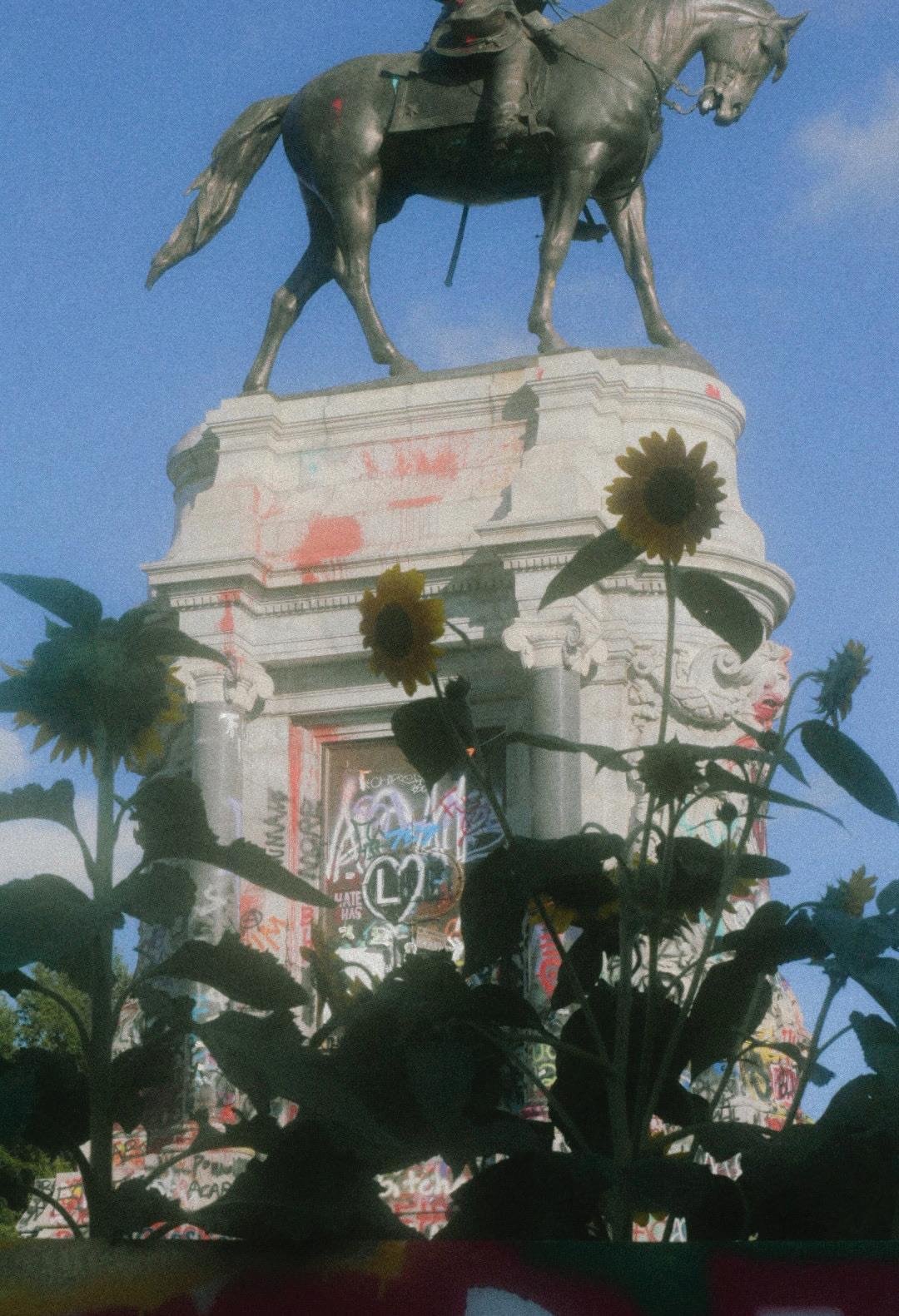
14 Amendment
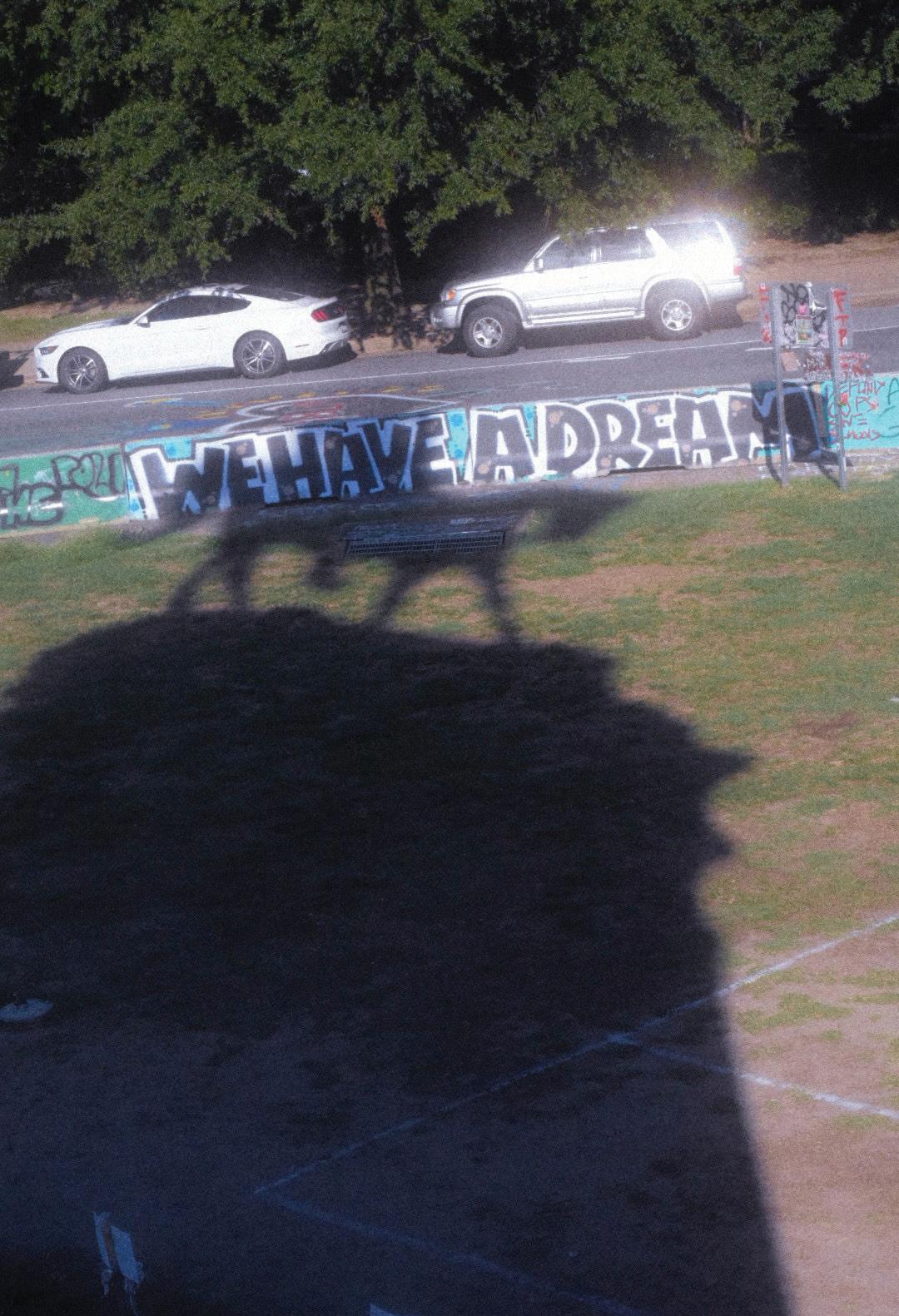
15 Literary and Art Journal LIGHTPAINTERR
Where Flowers Now Wilt
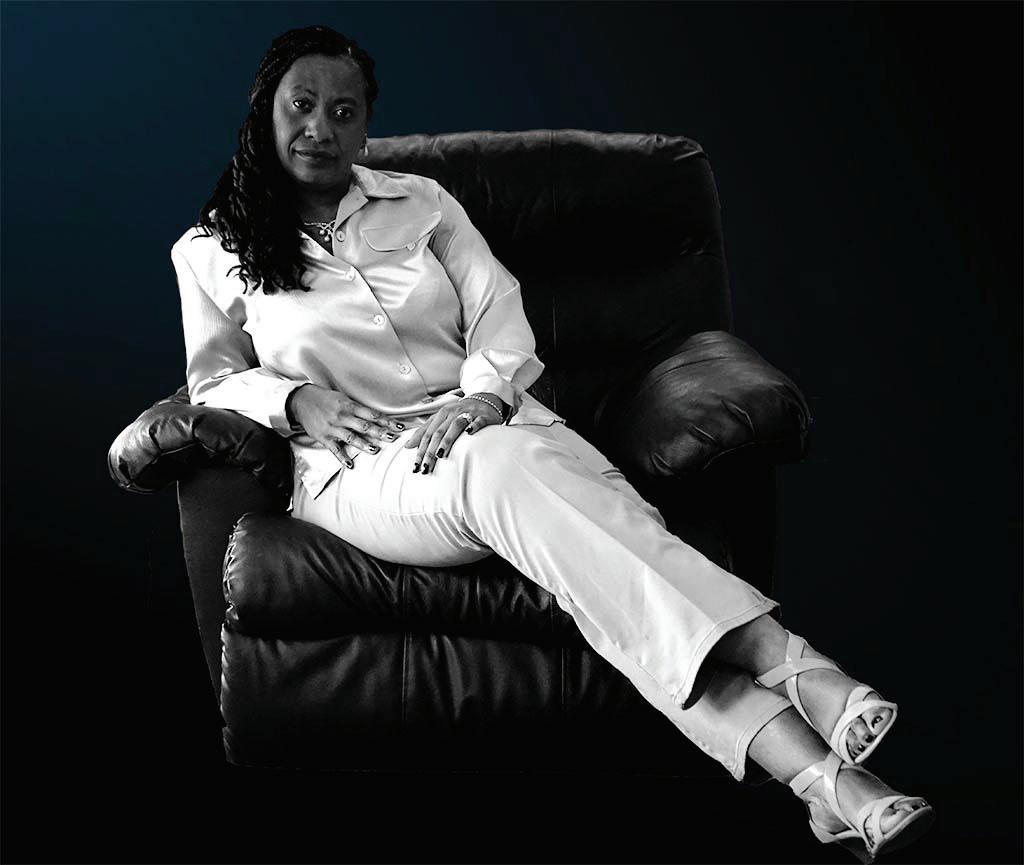
16 Amendment
Teairrah Green Mother
My Life Matters Too
Taylor
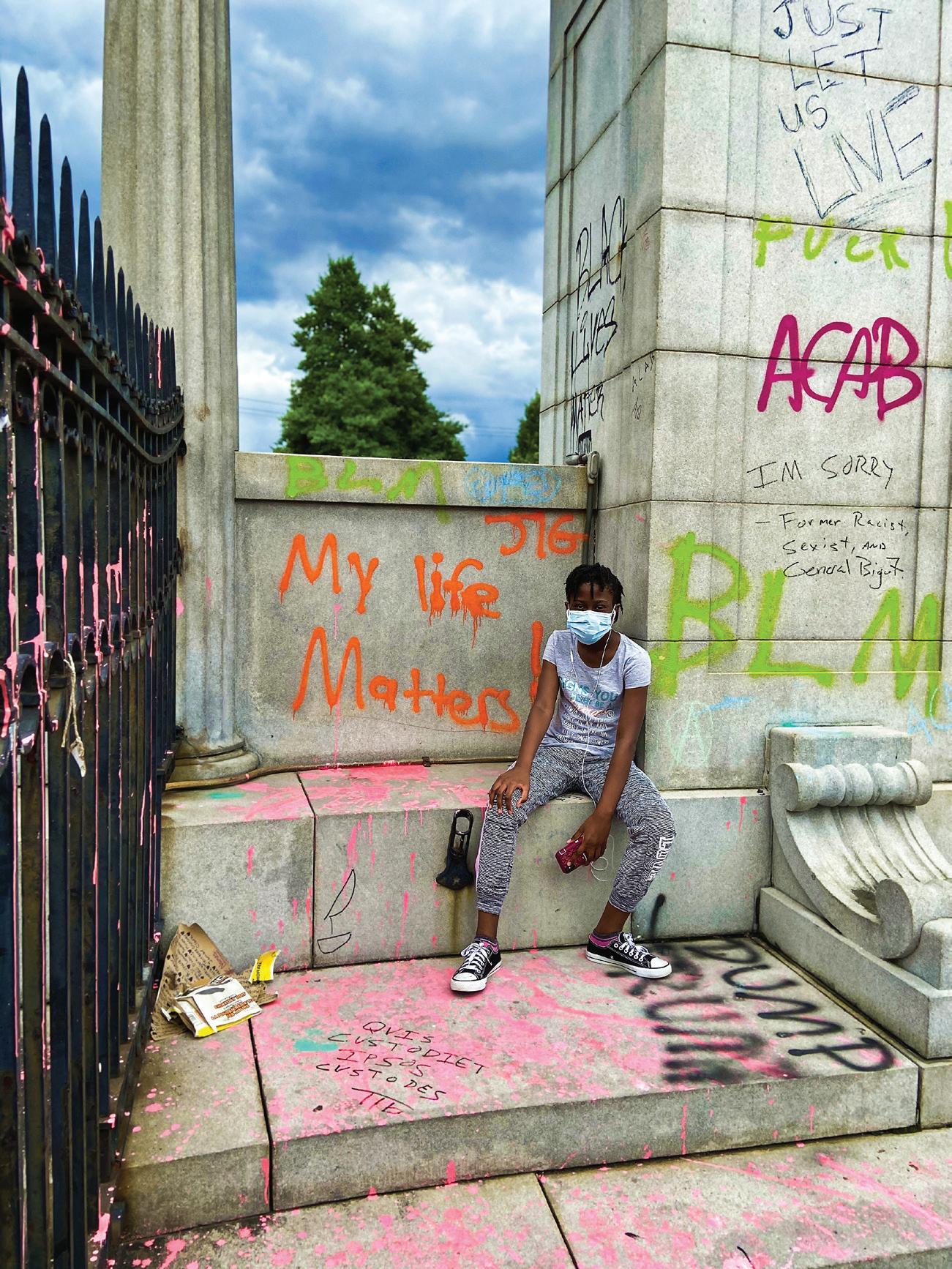
17 Literary and Art Journal
Alexzane
Red
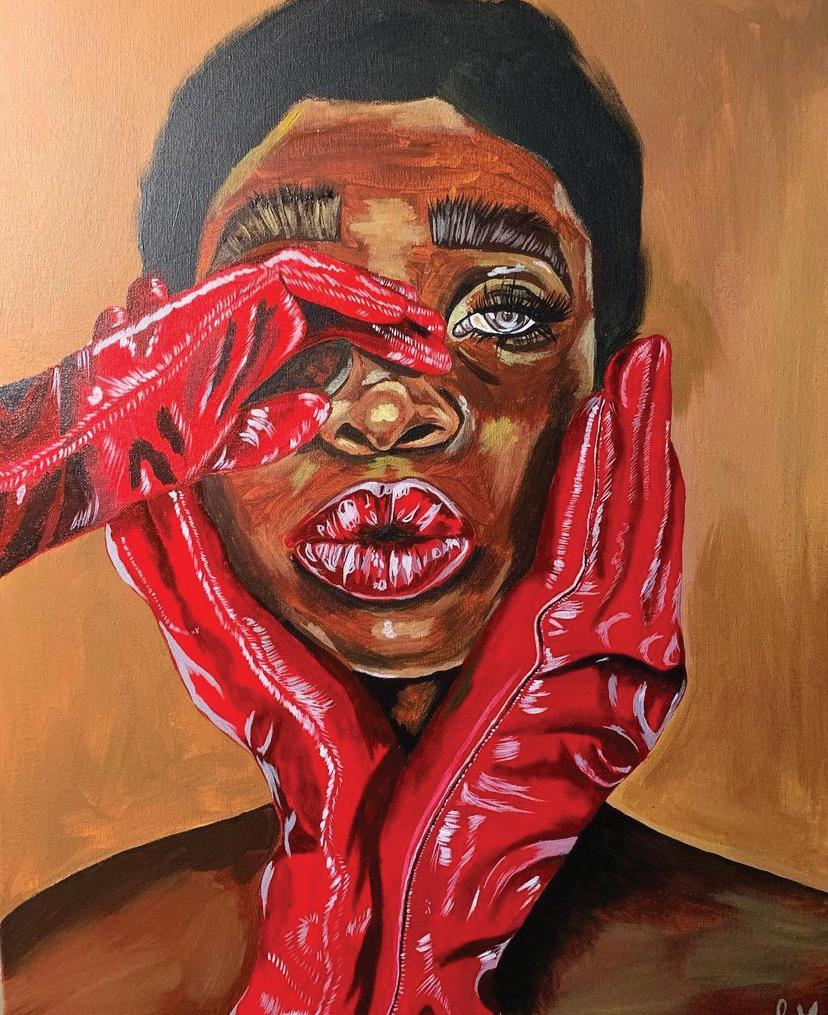
18 Amendment
Iyana Graham
My Power, Your Desire J.C.
Hill
You desire me. You detest me, but you desire me. Every feature that adorns me you despise. Every trait that distinguishes me you abhor. Every piece that forms me you revile. Still you desire them and you desire me.
Why do you desire me?
Because you know my power
And you desperately want to control it. You want to shape me into your tool
Until I am no longer usable. You want to shrink me into your fool
Until I am no longer diminishable. By doing so I will no longer be powerful. And then I will be disposable.
I know you desire me.
I know you desire the power I hold.
e power that is:
All the features you despise, All the traits you abhor, All the pieces you revile.
I know you detest me.
Why do you detest me?
Because you can’t contain me.
19 Literary and Art Journal
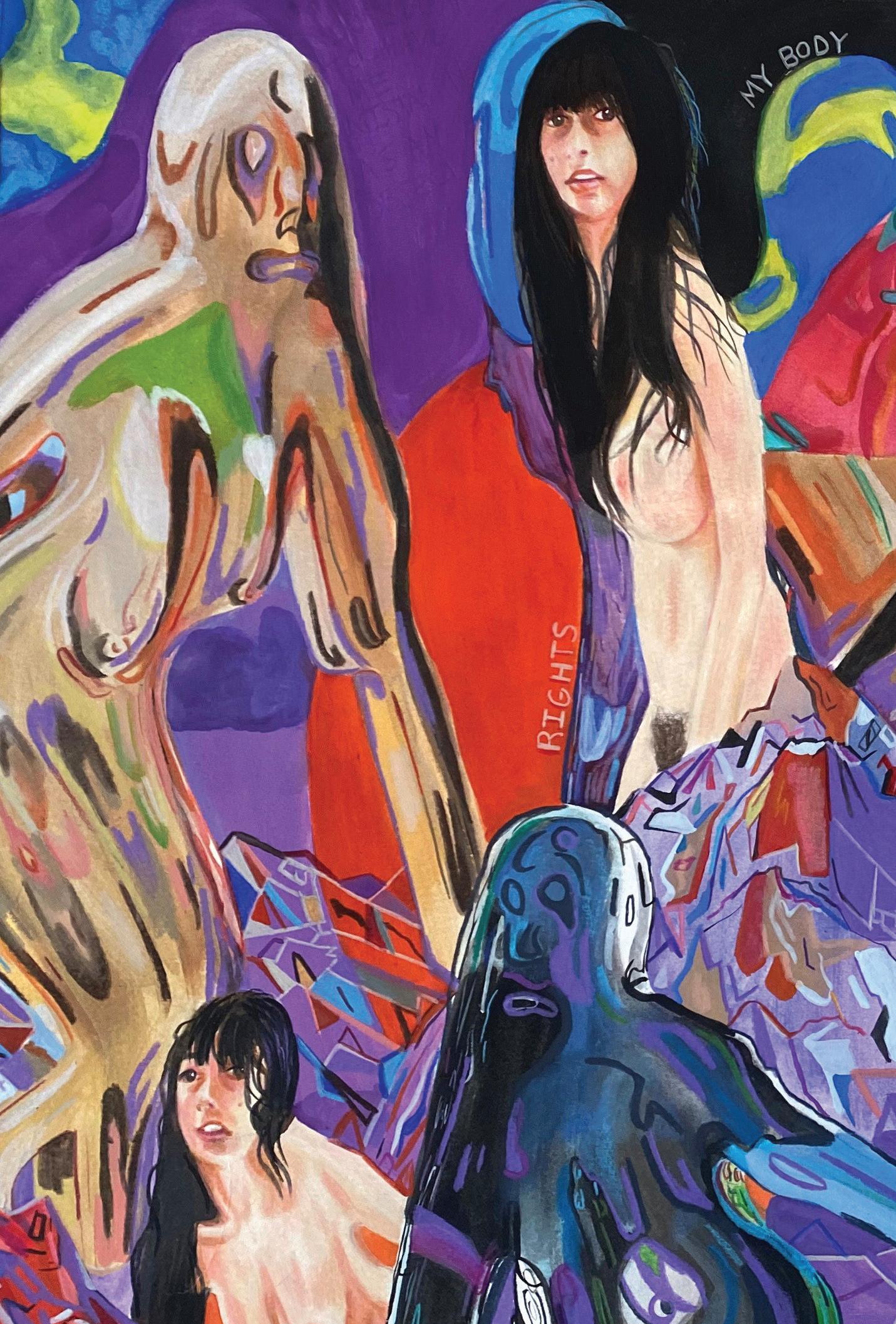
Coat Hanger Imagery CW
Bodily Autonomy
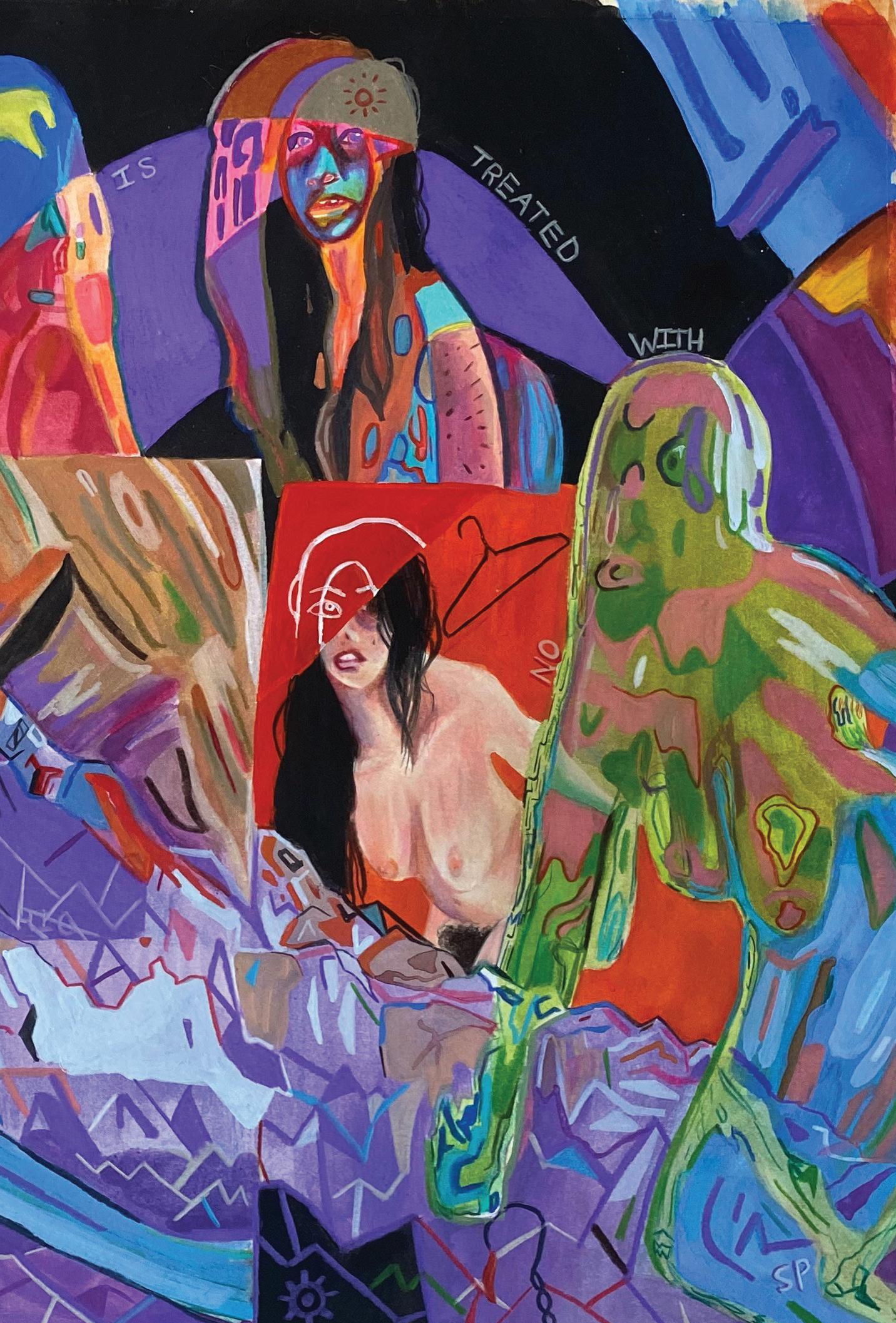 Sirena Pearl
Sirena Pearl
Wanda in Her Ermine Furs
Wanda in her Ermine Furs, is taken from the novella, “Venus in Furs,” by Leopold von Sacher-Masoch, which denotes themes of sadomasochism. is is emulated in the layered magenta which imitates Wanda’s sexual dominance over Severin.
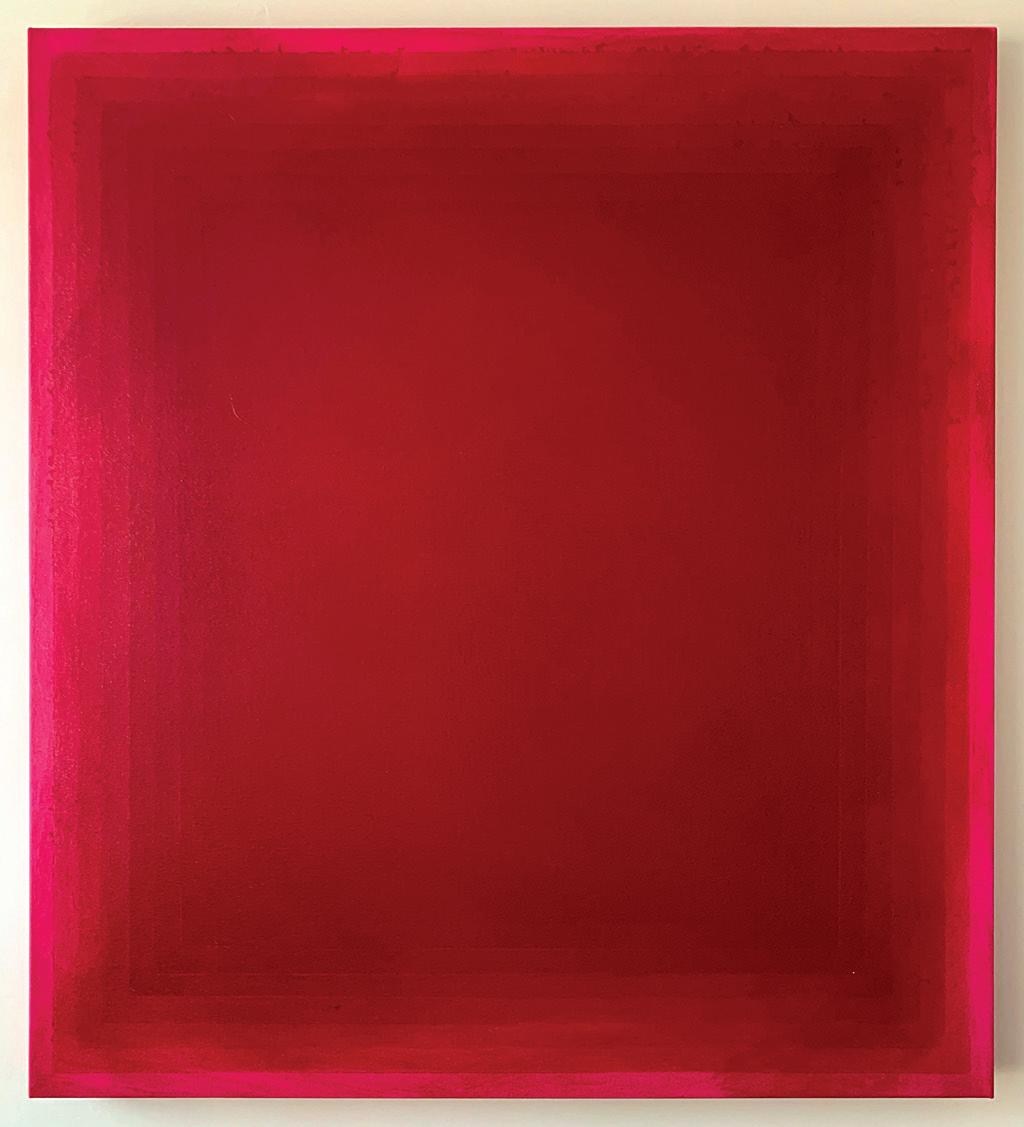
22 Amendment
Andy Mazzella
To contrast, Stephanie’s layers of phthalo blue are inspired by “Stephanie Says” by Lou Reed. e poem takes the audience through Stephanie’s inner melancholia as she re ects on her past experiences with the people in her life. In both pieces, the abstraction of color pulls from these characters and their personalities, while the layering process helps to channel their emotional space.
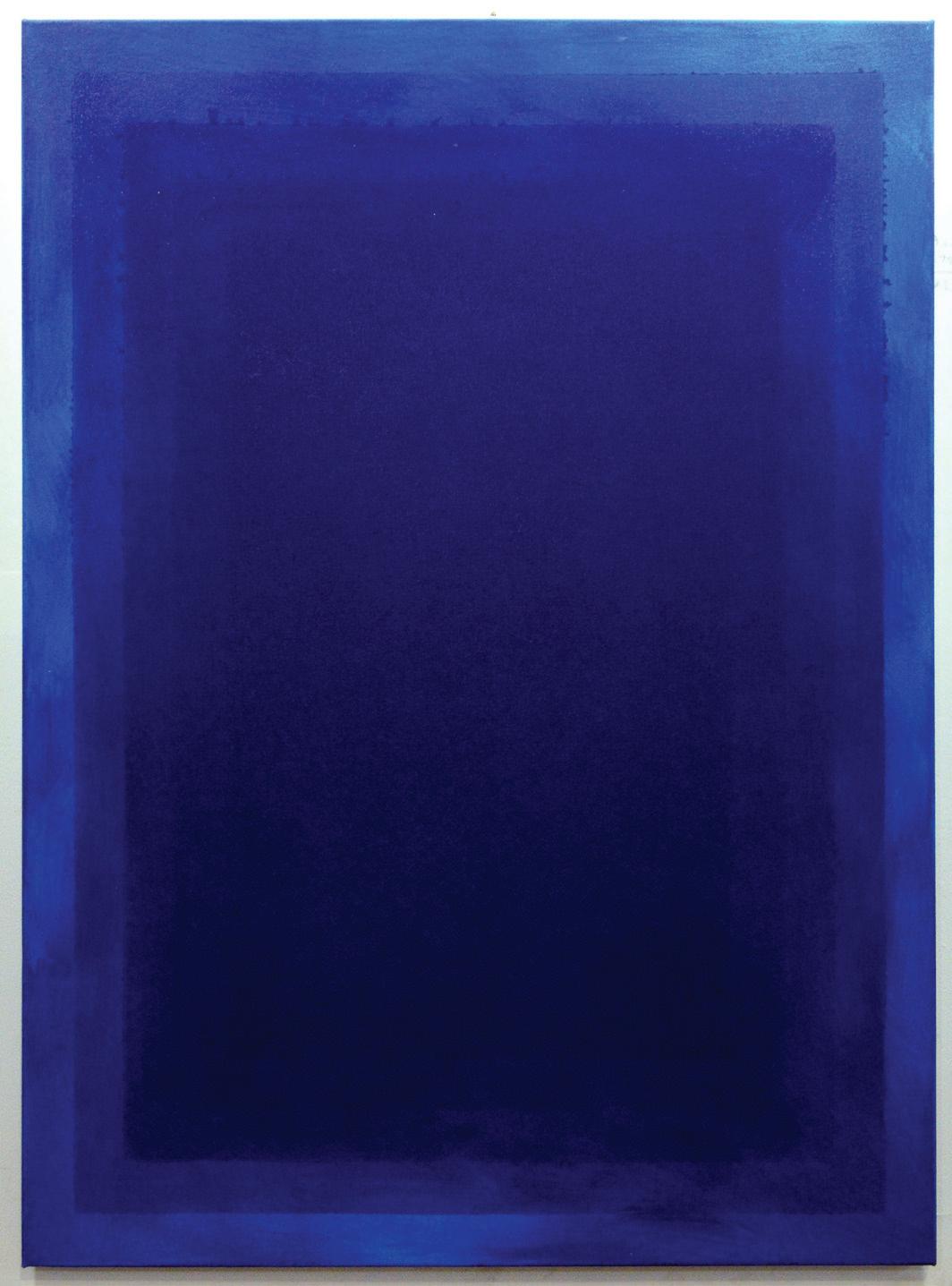
23 Literary and Art Journal
Andy Mazzella
Stephanie
Reflections Anonymous
Memory bleeds through the pages of the present. I am not the person I once was, but I see remnants of her in every re ection I allow myself to look at. Mostly I see who I have worked to become; driven, kind, assured, content, but deep in the recesses of my eyes, I see her. I see the bruises on her body; I see her tremble with fear and pain.
She is not a phantom or a shadow but a memory. A memory I do not like. A memory that I cannot seem to forget. I was her, and she will be me. Sometimes I allow myself time to step through the re ection and relive the past. I step into the person I once was, and the pain nearly drowns me. I hear the endless cacophony of cruelty in the voices of those I love. Words like failure, fake, sel sh, crack like a whip against the fragile boundaries of my mind. I feel the desperation for anyone around me to see me, know me, love me. My mind dri s from memory to memory, some fuzzy, some clear. I see a man I loved with a lighter on his arm, begging me to stop the pain. I see the people I wanted to call friends calling me too broken to repair.. I see my father close the door a er telling me he won’t stay.
e pain pulls me in every direction until I am numb and dizzy. I feel my body move almost of its own accord as if I am merely a passenger in this body that used to be mine. My body turns itself so I can see them all too familiar stairs behind me. I scream to be liberated from this memory, to leave the mirror and lock the past away from view. e old body does not listen and climbs the stairs. I thrash against my mental prison, begging this body to stop. Don’t climb the steps. Go home. Pet your dog. Anything but this. e all too familiar sight comes into view out of the darkness. In front of me, I see a roof, and I hear my voice whisper into a phone; the words were jumbled and unintelligible. It looks just like it did that night. It was cool, and I could hear the faint sounds of merriment from a far-o party. I could see the mountains and several stories down, the car I sold so long ago. I didn’t want to relive this. I knew what came next, and I didn’t want it. I felt the body sob as she turned o the phone. Her toes shi ed to the edge, and her eyes looked down. One foot and then the other, the body teetered. It loses its nerve and steps o the edgecollapsing in a symphony of pain and self-hatred. How could I do this? How could I let it get this far? Emptiness consumed me, and everything faded to black.
24 Amendment
Suicidal Ideation, Mental Health CW
I was wrenched back to the present, pulled through the mirror into my body. My eyes lled with tears, I tried to control the pain. e girl I once was stared back at me through the mirror. I want to shatter my re ection, grind the glass into sand, but I hear the faintest whisper reverberate behind the mirror.
“When does it stop?”
Regret washes over me. I remember asking that every day. I remember just wanting the pain to be over. I remember. I want to tell her in an hour, a day, a year, but the truth is far more complicated than that. I o er the memory my hand and show her premonitions of what’s to come. She watches as the space around us shi s. She sees a lost version of herself return home, afraid to sleep in her own bed. She sees our body shaking on the living room carpet, unable to speak or move. She sees our mother li us onto the couch and stroke our hair as we weep. She closes her eyes and winces in pain, but I urge her to breathe and keep watching.
She sees us sitting on a couch talking to a gentleman with patient eyes and a black notebook. He listens as we unravel our twisted tale, telling stories of pain, rejection, and loss. We write and paint to occupy our time. We learn to sew. We walk our dog in the sunshine. We laugh with our family. We sing. We dance. We stretch our bodies and our mind. What starts as eeting moments of joy becomes something deeper. e man with the patient eyes encourages us to stay with that, to be present, to be accurate. We learn to breathe between the pain. We learn to believe ourselves. And then she watches as the careful tower of protection crumbles around us.
She sees the friends that once held us up betray us. She sees us descend once again into the pain we strived so hard to li ourselves out of. She sees us once again consider the familiar stairs. She sees pain, she sees rejection, she sees su ering. She is crestfallen, but I ask her to keep watching. She watches. We think about the stairs again and again but never go. We say it’s for our family, for our dog, for anyone other than ourselves. e gentleman with the patient eyes looks at us kindly, without pretense; he tells us it’s us. We are keeping us safe. We have always kept us safe. We stepped o the ledge. We woke up every day and lived. Even when it was hard. Even when it was scary. Even when we couldn’t see the light. We lived.
She watches as we rebuilt our tower of protection, but this time it wasn’t a tower. It was a city. Complicated and challenging, but vibrant and alive. We watch as the small pleasures became contentment. We watch as we struggle with pain and fear but persist. We watch as we fail time and time again but continued to try. We get it right. We get it wrong. But we keep trying. I turn to her and smile. She smiles back at me. I want to say something profound or deep to show her how far we’ve come.
25 Literary and Art Journal
I want to hold her close. I want to tell her she is loved. e spell is broken before I have the chance.
e visage of my past self gives way to my face now. It is fuller with lines etched by joy, stress, and pain. e mirror is just a mirror once again as memory returns to the chapters of the past. I look in my eyes and see her tucked away in the periphery of my mind. I place a hand on the cold glass and whisper the only words of comfort I can summon.
“Soon.”
26 Amendment
Haley Salmen
Fears
→
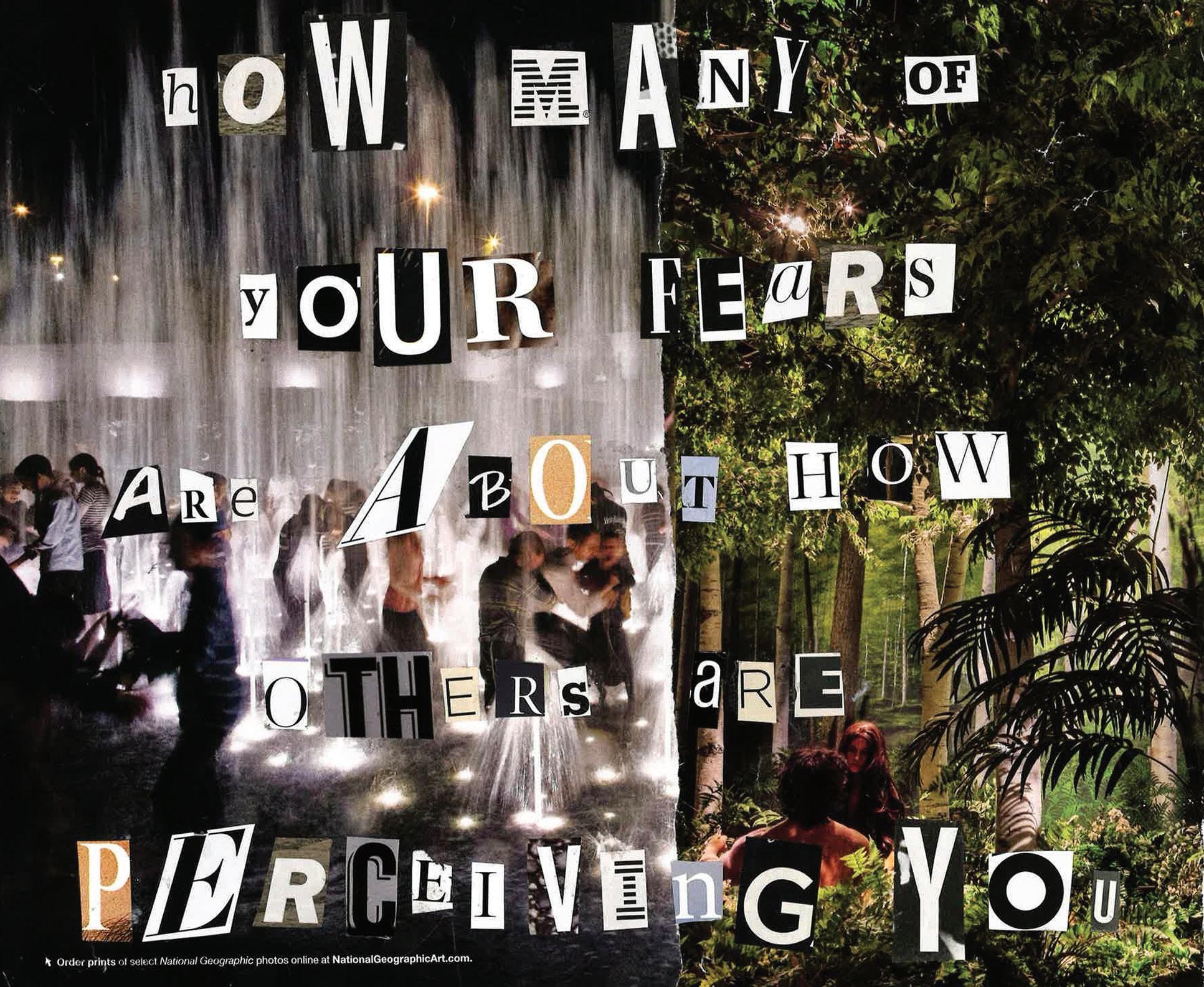
27 Literary and Art Journal
Ant Farm Madeline
Wade
ere’s an ant farm inside my chest. Just below my heart
I can feel it when I’m still.
Buzzing, writhing, Just enough to keep me moving. Just enough to make me sick.
I clutch my knees to my chest in my kitchen chair as all the color drains from my body and I match the pale gray cabinets.
I haven’t breathed out in 5 years. I haven’t rested my head in 20.
I grip my legs uncomfortably tight to my chest, My legs, they can feel the buzzing, held So tight, during dinner, to be sure all of me is thereEverything, protected, each part intact still.
I was born here.
On the edge of my seat. Eyes forced wide, Ears alert, Mind racing-
I’m sick to my stomach so o en these days, Wishing I could purge myself of this way that I live. Wishing I could exhale and not sound so shaky.
I think the little ants gnawed out a spot somewhere in my brain. I see them casting shadows on the visions behind my eyes. and, I know they don’t belong, but I like the little tingle of their feet on my skin as they crawl in and out of my ears.
28 Amendment
Anxiety, Self Poisoning CW
I loosen my grip so my feet fall to the oor, leaving exposed my hollowed form, my gray hands now resting on the table, palms towards the low ceiling, shaking slightly.
When I was ve my mother found me in our garage sucking down ant poison like soda. I smiled at her big, and told her it tasted like strawberries.
29 Literary and Art Journal
Featured Contributor:
Elysia Lin
30 Amendment
I am currently a fourth-year student pursuing interdisciplinary studies, with minors in medical humanities and creative writing. I was born and raised in the Roanoke Valley. Beyond writing, I also engage in women’s health research, peer health education, and some teaching and instruction. I love spending time outdoors, baking bread, and cra s.
Growing up, I took writing and literature a little bit for granted. I was very much a “STEM kid” and had always nurtured that love for science over all else. Early in college, I had an English professor who was the rst to really push me to explore writing as an avenue to both deepen a fascination with science and natural systems, but also develop my own voice and understanding of everything else around me—and that intersection was the best of both worlds.
Featured Contributor
31 Literary and Art Journal “
Much of my writing to date likely comes from my lived experiences as a person of color—a daughter of immigrants— growing up in a mostly-white, semi-rural community. ere is a lot of individual wrestling with dual identity and belongingness and sel ood that emerges from that, while still recognizing my immense privilege as an Asian American, cis-gender woman raised in a two-parent household with relative nancial security. Some of my writing is coming-of-age, in a way, in moving away from home for the rst time and seeing that, wow, the world is so much larger, more complicated, and diverse than I had ever imagined. And some of it comes from the tension between reconciling my own formative experiences of girlhood in my small corner of the Virginia—a time that I re ect on with fondness and nostalgia—with the understanding that, for many others, and for myself at times, these same experiences/ places/systems in our country are spaces that produce anger, resistance, and interrogation.
32 Amendment
”
As Necessary Beings
Man is a little world. —Proclus
Elysia Lin
We believed we could not have failed to exist, if only temporarily. On long days we stood in a ooded delta a er summer rain, sweetness still lingering, wrists plunged into dark basins. Our hands cupped loosely the lacquered underbellies of snakes, scales like small mirrors tessellating sky. In our sts, we held a rioting light. A er death, the philosophers said, our eeting beings become luciform: vital breath released, glory undone, untethered from the material esh.
On the river’s face, we skipped at stones over collected human debris: fence wire, two pincushions, a wreath of wedding owers, washed now from some disassembled homes. Imagine the temporal soul held in the palm, impressed gently in the skin like a signet ring into sun-warmed wax. In the ow, we saw our faces, composite image of a mother, ngers quiet to the so meridian of a newborn’s skull. Imagine a story of bones, ri ed and loomed together, a good thing converging into another sacred whole, the body an atlas a er all our open wounds have closed.
33 Literary and Art Journal
Motherland, 20 Years Postpartum
ey name it ontogeny, as in birth of one whole being. Every body emerges from the same dark places. Every body once a single-chamber heart blooming iron. Innocent machine, wrestling
so earth, the ood’s deluge. From the shes: bright water in the lung, caught in paper gills,
lantern mouths a yawning river. Language caught in the sparrow’s bloodied beak,
ready passage to the pliant wetness of worms and migratory things, my orphaned tongue a clumsy division
of worlds. Obstare, Latin root to be present, to be here. Some wonder of mothers, of generations within, bearing the heaving weight of it all. Every body from all places— how much movement one heart can withstand.
Elysia Lin
34 Amendment
e speaker in this poem grapples with the continual struggle for self-recognition in language, heritage, and expressions of self that compete with the new cultural identities and landscapes of the United States that many must navigate. ough the language refers to both the bodily and cultural conceptions of “mother,” the mother here is representative of something broader and ungendered; rather, it is a return to safety. is poem was written prior to the Supreme Court decision overturning Roe v. Wade in 2022, and in its a ermath may remind us of the sanctioned violence against reproductive rights in our country.
e concerns named in this poem are of a di erent origin, though I think they speak to the same crisis of acknowledged humanity, acknowledged place, and the question of who exactly has value in this world.
Contributor 35 Literary and Art Journal
Featured
Infant Death, Medical Racism CW
Protocol: Meditations on Care
Elysia Lin
All visitors must be greeted with a smile. Most smile back, unless experiencing a stroke event, when they only smile with half a curved lip, half wrenched at in an awkward, sorry line. Most visitors are not having strokes, though it is better to be safe than dead, Clerk says. Other tell-tale signs: an imbalanced portrait of two hands raised, words sliding into the next. Clerks’ scrubs are green, printed with purple monkeys. When she waves her arm, monkeys dance in synchrony, limbs twisting in a single ripple. When she arches forward, they bend and touch their toes.
All visitors must wash their hands. On a Sunday, I recite to a woman in her forties a series of steps on proper handwashing technique, pretend I did not spend nights at the sink, scrubbing to the count of music until my hands rawed. I fold her hands in mine, lather soap between her palms until they are glazed milk-white. We rinse the skin on our forearms up to our knobbed elbows. Her brow drips sweat upon our clean hands.
No visitors more than two unless the baby is about to expire. Clerk says expire and means Died Expectedly of something like promptness. Usually the doctor’s predictions are right and babies expire when they are due. Clerk says it makes formula orders less of a hassle, when the babies expire on time. at day, I walk to the corner grocery store to buy milk. Secret shoppers are being lmed for a show nobody sees because it airs in the extended nothingness of daytime cable. Someone has le a crate of milk on a shelf in the oriental aisle, tucked among the Asian sauces— Ponzu, Sambal, Hoisin—curdled contents thick and clinging.
Visitors must wear security bands at all times. Red and white, sheen of an old scar healed over. In the well-baby nursery all newborns wear security bands wound tight around their tiny wrists, barely the diameter of a bottle cap. A er orientation, we are taken to the other nursery, where babies still too fragile to hold are kept. I watch Baby M turn in restless sleep, accordion of her chest folding in tune to her
36 Amendment
ventilator beeping. Here, babies do not wear candy-stripe bracelets. No one wants to steal a sick baby, Clerk says. I want her to take it back, confess this untruth. ere is only the hum of machines.
In the case of an abduction, sound alarm for Doctor Pink. A duress button is hidden under the table on the wall with great glass windows overlooking Marshall Street and the man at the Salvadorian food cart, wearing the same peeling pair of running shoes. I listen to a lecture on the East Marshall Street Well, follow a journey of Ancestral Remains from the Smithsonian archives to Richmond, rst and nal resting place. Clerk says, something awful, those wanted bodies of men and women thieved from their graves, bodies of babies turned to wax and brine under lantern light: molar here, pelvic bone there, vertebrae constellated across a nation, and no record of names, only dislocated parts.
is is a prose poem written towards occurrences during my placement on the NICU ward at VCU Health during the height of the COVID pandemic and Black Lives Matter movement. Among all of this disruption and strangeness, I was working in an environment with one deeply vulnerable group—newborns—in a period when very few leaders in our country seemed to care for the well-being of people, but especially people of color. At the same time, Richmond and its medical institutions were facing a reckoning of sorts, a fraught historical legacy that concluded with the return of the Ancestral Remains—yet another instance of lack of care for people, neighbors, and families. Writing this poem became a way to reimagine and confront anger about these injustices, using standard hospital protocol as an entranceway into that conversation.
Featured Contributor 37 Literary and Art Journal
changeling children
C. Pierson
I was dirt-stained and scraped, brimming with the potential of a child raised without religion. in as a breeze and timid like a doe, but inside-- the rotted eye of a tree, the swirling madness and confusion of a child wronged by the world. Everything was something to learn, everything was wild and dancing and bright. I memorized the names and traits of speckled beasts from other continents and longed for their claws.
Cigarette ash singed my hair but now I drink the smoke in whenever it passes me on the street, relishing the nostalgia of slow death by addiction. I picked at thorn-cuts so that they’d leave scars. I shoved my hands in mud and watched the skin fade until there was nothing but earth. I got close enough to rabbits that I could count their eyelashes, and at the second that I’d thought I’d touch it, a urry of motion and it was gone, leaving me with nothing but the directionless energy of primal instinct and hands that are still so with childhood.
I imagined my ngers like claws when I raced boys on the playground. Over and over I imagined the arcane curve of horns, the unblinking eyes of gods, the clay-covered hands of potters and the life in my veins. e trembling, unfurling of leaves, the howls of mythological creatures in the night. So much life in the world and I had no idea how to taste it. No idea how to let the energy inside out, how to keep it from burning me up-- but too late, my bones grew and stretched and my memories piled up and now I’m nothing but a smoking match, all burned up and struck.
Once, a gi ed child, a beautiful child. Now, a shapeshi er, a changeling swapped in the cradle, an imposter. Still feeling the weight of antlers on my skull and the points of my spine like daggers, I choke on this energy that comes with being trapped in a body I didn’t ask for, and when I’m just a hollowed out trunk echoing with the cries of the child that was, someone will look down inside and they will see all of these words inscribed on the dead wood walls, like gibberish in a madman’s cell.
38 Amendment
Abby Bressette Drought →
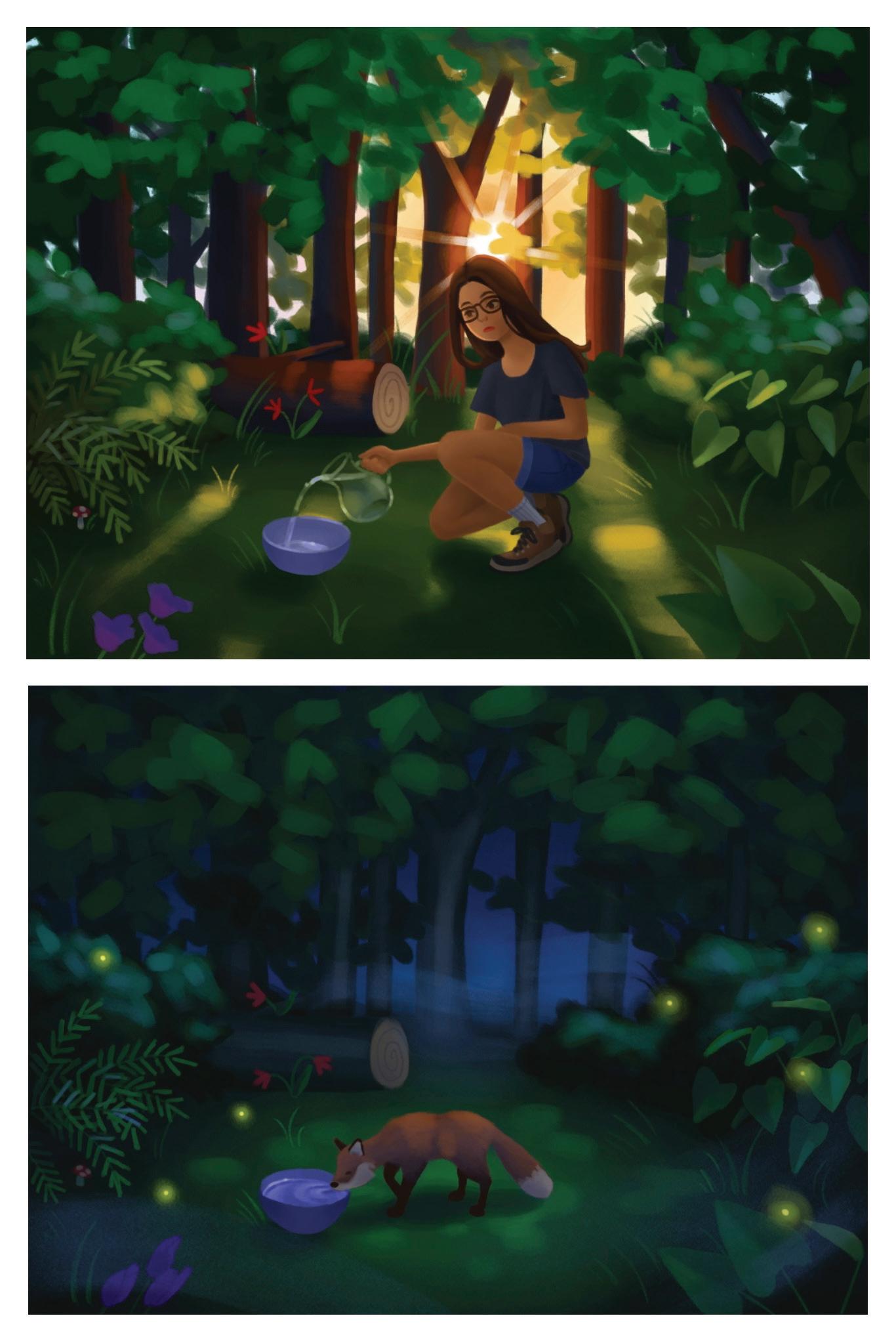
39 Literary and Art Journal
Black Carbon
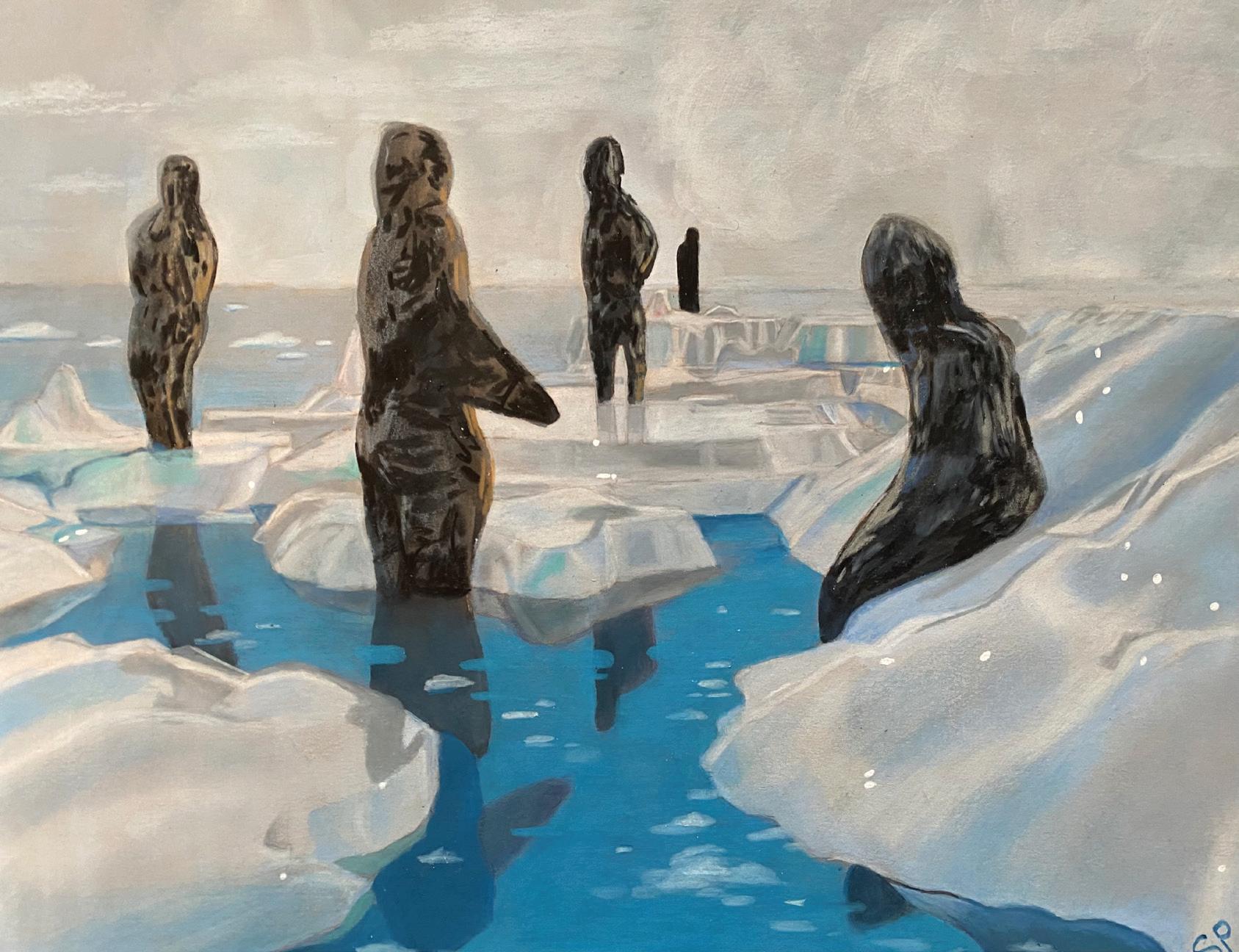
40 Amendment
Sirena Pearl
→
River Maja Olsson
A Future
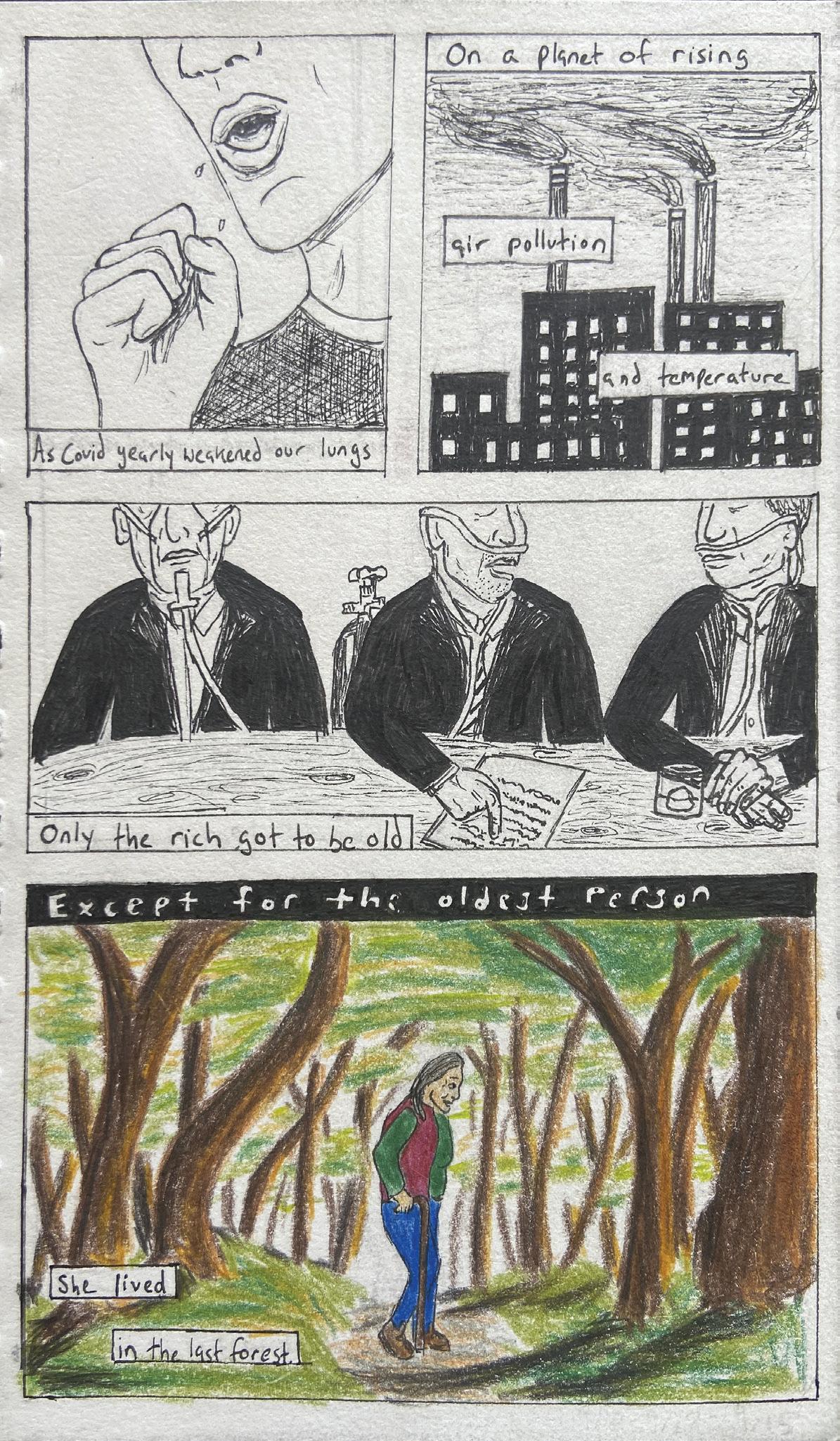
41 Literary and Art Journal
Vanilla Extract
Maddie Martin
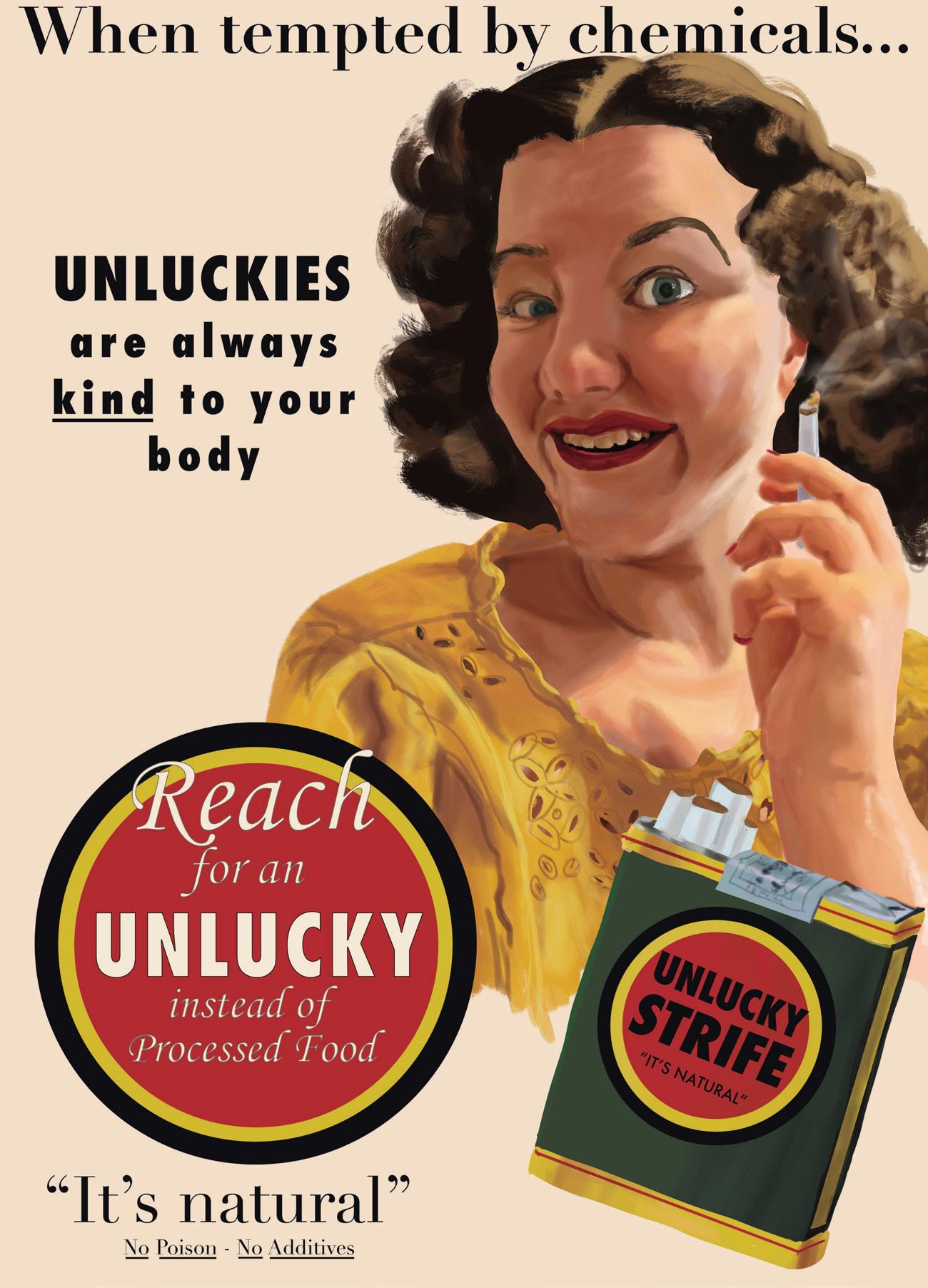
42 Amendment
A Portrait of Irony
Madeline Bitzer
inadequate. uncommunicative. unseen. unheard of. unavailable. absent physical and emotional. glassy screen. moving pictures. electricity. a golden haze surrounding the dull gray box. ideally scripted dialogues. shiny and feign actors. tiny pixels that make up a portrait. a portrait of a life not led by you. you consider yourself an Outlier. you don’t even know the meaning of that word. fake laughter, stuck-up jokes, misogynistic men, As I Lay Dying in front of the lit up screen. advertisements for places in this Brave New World you will deny not having the courage to see. passions you cannot bear to sympathize. virtues & vices you do dictate whether sinful or godly in your Prideful and Prejudiced opinion. what deceitful & mendacious truths you speak of so deliberately and In Cold Blood. how ironic. you label literature as pointless, yet you refuse to see the error of your ways. when i needed a father, where were you? when i needed guidance, where were you? when you couldn’t be there for me: Capote and Cummings were. Austen wrote me a better ending. Vuong held me tight. Shakespeare read prose and verse to me in the light as i feared for more than just the dark. Hemingway led me on stormy and wild adventures: full of marlins and bulls, that felt more than just imaginative. & Faulkner gave me ambition and compassion: two things you have never felt. so in the dull room, full of past memories of a family dwindling from heart, with the starlet light burning intensely at rst, but steadily fading with time, remember my sickly gure in the background: a pale ghost, and think fondly of the times you mislabeled me, for being narrow-minded & ungrateful: everything you are. like when you depicted my ideology as being persuadable. for “going along with the crowd.” or, when you saw me gathering towards more healthy and loving relationships, you decided i was a “ghastly and egotistical daughter.” why don’t you think about how you slacked as a father and tell me who is at fault? think about me yearningly as you see me nally leave. think about how a television life is more valuable than your own. how you thought this until you nally saw the tiny pixels of your steady life desert you, and think about how your life will always be those fast-moving, two-faced stars, rehearsed pictures: nothing but…fake.
43 Literary and Art Journal
Untitled Artist: Judith Glantzman
Madeline Bitzer
I had kept those blood-stained shoes from that memorable day. Over the years they had started to look like an artifact: a lost story. I pulled them out for the rst time since that notable event - days before my ight took o . ey were the deciding factor to visit my hometown: to question the questionable.
e touch of the scratchy, cheap lace on my callused hands and the smell of the stale and rank dried blood made me reminisce on all that I had lost without a choice. It all came back to me in that slit of a moment…
I remember it like a so dream. e edges hazed over to create curved lines and blurred details. My neck started to ache with whiplash. My breath shortened. My eyes grew wide. e sound of rain splattering outside on the cavernous ceiling. Echoing through my ears. roat dry. My shoes and heels bloody. is wasn’t a nightmare. is was real. I wanted to go back. To that morning. To the day before. Anything. Anything was better than this.
e sound of clinking glasses brings me back to that moment - to that day. e he y steam of hot tea - not hot enough to burn you, but hot enough to swarm through your gut, invade your insides and warm you so that you’re nice and cozywas once a condolence and now makes me sick to my stomach.
at’s how that day started: our regulated morning tea. e classical music swelled from the other room; in addition, to the sweet tonal sounds of Frank Sinatra, the music came from an old, worn victrola my mother had inherited from her great-grandmother - who had long since been deceased. e scratch of the metal tip on the vinyl added to the aesthetic of the smooth sounds of Sinatra’s voice oating through our china- lled, lace-decorated, and rain splattered Seattle apartment.
On the wall - adjacent from where I was facing - hung the calendar that de ned our everyday lives. Every morning I would check the little boxes, lled with the scribble of my mothers cursive handwriting. On that particular morning, I remember looking up and seeing blank boxes where her handwriting should have been, but instead was absent: nothing planned. I remember being confused by that. If my mother was anything, she was punctual.
44 Amendment
Child Abuse and Abandonment CW
We sipped on our English breakfast tea; the light slurp and the ring of porcelain on porcelain were the only other sounds added to the melodic tones relaying from the speaker. We didn’t speak. We never did.
I felt like we lived in an exemplary dollhouse. Everything so shiny and plastic. Everything was so neat, so perfect, that I was afraid to touch anything. I was a doll: and my mother was playing with me.
On that haunting morning, she had dressed me in my nest clothes. We weren’t much church-goers, but we each had one special occasion out t. We would wear these out ts on Christmas Eve - though we had no family to visit - and again on Easter when we went Easter egg hunting at the park around the corner from my school.
I remember her buttoning up my dress, the stale fabric still fresh on my memory. e ivory-colored fabric with a pink, satin waistband that tied into a large bow in the back, making it impossible to pee without aid from my mother, was zipped onto me. She then added the matching bow into my dirty-blond hair, tying it tight around my skull, as to avoid it falling out mid-day and her having to bother with xing it. Her hand lingered longer than normal on the back of my head. Her ngertips brushed down through my hair - touching the so ness of my freshly conditioned locks. She dropped her hand and went on with her duties.
I then sat with my back straight on the edge of her unmade bed; moreover, I was only sitting straight because the dress was starting to get tight on me. My mother had bought me this dress when I was seven, being eight at that time, I was a little too tall, and a little too big, but I didn’t dare tell her.
As I sat with my ribs pressed against the small waist of the cream-colored dress, I watched in awe of my mother dressing.
She was so awless, so smooth, and so delicate.
She was like a fallen leaf. e golden hues and burnt-caramel shades make it impeccable to look at, yet the very notion of the leaf fallen means that it is near the end; soon to break down and dissolve into the muddy and grassy ground. Soon to disappear.
She untied her silk robe, which was the color of the night sky in the mountains: Navy blue with the tiniest of white pearls decorated along the edges. e moon and the stars. She slipped into her special occasion dress: a similar ivory-colored dress with lace on the outside and a stormy purple, the color of a dark bruise, waistband clenching around her middle. e whi of old fabric blew through the air in front of where I sat as her dress apped around as she tugged it on. She didn’t have a matching bow in her hair; however, she had two thin clips that she used to push back her mocha-colored hair on either side of her face. She was so beautiful: so young. As she looked in her golden vanity mirror doing her makeup, she saw me studying her in the re ection. She winked at me with her faux eyelashes already
45 Literary and Art Journal
on - surrounding her hazel eyes, which she shared with me - and her dark maroon lipstick being applied. at wink was a spark for me. at wink had held a mysterious undertone to it. e message she was conveying in her eyes was monstrous and diminutive.
e air was crisp that day when we exited the lobby of our apartment. e door blew open in the autumn wind and we had to push it closed with our bodies to avoid the heat from the lobby and the cold, fall air from mixing together to create a luke-warm and gray in between.
e memory of my mother walking ahead of me down the steps and onto the sidewalk below is ironed onto my consciousness. I think back to that image many endless nights and lonely mornings.
e leaves swelled around us in a mystic haze: I felt magical. I felt like I was on a stage and the leaves around me were the spotlight illuminating my qualities.
My mother grasped my hand tightly as we hobbled our way through the busy streets towards the Frye Art Museum. My mother rarely took me out, especially to a museum. I felt that morning, when I woke up, that something was wrong. I felt it in the pit of my stomach. ere was an ache there that I couldn’t name. I should have been suspicious when my mother took me to my rst art museum. I should have been suspicious about the calendar and the dresses. I should have known.
e sky began to cry down upon us. e pit of my stomach dropped as the rain poured. Little droplets of chilled water began to trickle onto our dry hair, my mother’s makeuped face, and our fancy dresses. plop plop plop
Her handy umbrella, which she always carried with her since rain in Seattle was as unpredictable as her, was opened with a singular slide of the hand and whip of the fabric on metal being pushed open.
Her umbrella, the color of burnt co ee, was our only protection from the harm in the sky: our only shield.
We made it to the protection of the entryway of the museums’ doors. e architecture being the larger umbrella in the play of things.
My mother paid at the front and then we steadily walked through to the exhibits. We steered clear of anything historical or European. My mother led me straight to the contemporary art as though she had decided to go there speci cally for that.
We weaved between people along the way; tourists, couples holding hands, art
46 Amendment
critics standing puzzled in front of newly displayed pieces, security guards keeping watch, and slow walkers who never stopped to stare - but instead kept at a certain pace throughout the entire museum - a trolly that never came to a pause, but instead you had to plan your leap o of it in perfect timing. ese people weren’t willing to take that leap of faith o the bumpy ride.
My mother’s grasp on my hand grew tighter as we went deeper into the forest of modern art. Her palm was dry and cold, whereas mine was sweaty with the connection of hers. I stumbled over my shoes, realizing how tight they felt on my growing feet. Blisters had started on the back of my heels. I remember looking down as I was pulled forward by my mother, blood had started to drip down onto my clean, eggshell white shoes. Mother was not going to be happy once she found out.
I looked ahead and saw what my mother was being pulled toward. It was at the end of the exhibit hallway, the last painting to be showcased. e corner was dingy and gloomy; the only light was a singular bulb that casted it’s luminous glow on the picture. e wall the artwork hung on was blood-red, the type of blood that has been sitting out for days: dried and sun-baked.
I remember feeling enclosed in the room. Su ocated. e air was stu y with the faint smell of decay, probably from the rotting canvases some of the older paintings had been completed on. I looked forward and up at the piece of art my mother was so captivated by.
I felt her breathe in sharply as her breath was taken away with the sight of the piece. It was hand drawn - or at least it looked that way - on a pale rosé paper background. e lines were blurred and frenzy; as though the drawing was done in a hurry with the artist’s eyes closed. But within all the contradicting lines, there was a picture in the between. If you looked closely, you could just make out the image of a person - a small girl it looked like - with large, round eyes that looked amiable. e girl’s hands were placed below her chin and she was resting on them as though she was listening to something pleasant, perhaps some music on a victrola similar to what I had listened to that very morning.
My mother was frozen in place, her eyes were not blinking. Just below the drawing was the description. I remember leaning in closely to read the small Calibri font. e plaque read “Untitled. Artist: Judith Glantzman. Date: 2002. Medium: Pencil on Paper. Object Dimensions: 11 x 8 ½ in. Credit Line: Gi of the Artist.” I felt the weight of my mother’s hand on my back. I stood up straight and her hand moved to my shoulder.
She pulled me in close and whispered into my ear, “What do you see?”
“I see a drawing.”
She tilted her head to the side, as to get a new point of view: a new perspective. “Yes, it’s a drawing. But what do you see in the eyes?”
“ ey’re big.” I reported back to her. at clearly wasn’t the response my mother had wanted. She sighed with disap -
47 Literary and Art Journal
pointment and took a half step away from me.
“Name the emotion.” Impatience was rising in her voice and I worried a breakout would occur.
“I think she looks happy.” I murmured out, hoping that answer would su ce. “I think she looks lonely.” She wasn’t looking at me, but instead was staring intently at the drawing. e tone she used sounded to me as though she wasn’t telling me that the girl looked lonely, but instead was telling herself. Her lips were two straight lines, both a sense of sadness and nostalgia crossed over her face.
e more I remembered looking at the picture, the more entranced I became.
e lines looked at rst to be mistakes, but I soon realized that none of them were mistakes; they were all purposeful and ful lling to the meaning of the piece. She looked satis ed. She looked reserved. She looked content.
But my mother must not have felt the same way.
Somewhere throughout the time she questioned me about the emotions of the little girl in the drawing and the time I spent contemplating the artistic ability of this Judith Glantzmann, her hand had fallen o of my shoulder; her grasp had let loose - like little droplets of water falling from the sky or tears streaming down and staining whatever they let loose on.
I didn’t notice it at rst, but eventually the air next to and behind me became cold, like the wind had picked up and the temperature turned chilly.
I remember breaking free from the spell the picture had entailed on me, my eyesight cut loose from it and I turned to see nothing behind me.
I was alone. No mother.
I remember feeling odd at rst. Odd as in the sense when you get deja vu, or when you’re trying to fall asleep but instead of going unconscious, you are stuck in that in between sense where your body and senses are asleep but your consciousness is not quite yet.
So there I stood: lost and forsaken. e day started with an unhappy mother and an addled daughter: together from the start. Now, the day was ending with a desolated daughter and a liberated mother: separated on purpose.
e sky was downpouring upon me. I walked the streets of Seattle alone with only my dull, concrete-gray umbrella to protect me from the ood above me.
is was the rst time in twenty years that I was visiting my hometown, a er years of foster care and orphanages. I came here for one reason and one reason only.
e Frye Art Museum lingered above me in the opalescent sky. e incessant sprinkle of rain and overlay of clouds was a rude awakening compared to the sweet zephyr from the blithe Georgian skies, where I now lived.
48 Amendment
e stark stone of the outside walls of the museum blended in with the surrounding environment: monotonous and bleak.
As soon as I walked inside, a hush fell over me. e subdued lighting and the smell of musty wood and putrid canvas brought me back to that day again. e details swarmed to my memory and it took all my strength to not double over in agony.
I pushed forward to that crimson corner with the somber lighting.
I didn’t need a map, nor a guide to show me the way. My feet led me straight to it, as if it was only yesterday I had been dragged there by my mother instead of twenty years ago.
As I got closer to the enclosed corner, my heart started to beat out of my chest. My head began to get woozy and my thoughts went back and forth from the past to the present to the past to the present...
And then suddenly: there it was.
Just how I remembered it.
e salmon colored paper was the same shade, the sketched lines were not faded, but just as dominant as I remembered them. e havoc of the pencil was just as intricate. And the face was just as dictating.
But the eyes. e eyes were just as augmented.
I ignored the rest of the drawing and instead looked straight into the girl’s eyes. e charm those eyes placed on me was valiant, and the emotions behind those eyes was just as potent.
“What do you see?” my mother’s voice rang clear in my head. e echo of her voice made it sound like a dream: or a nightmare. e impression of her wa ed in my memory. I felt the burdensome weight of her hand on my shoulder just like I did many years before. I swear I could even smell her lilac and daisy scented perfume wa ing through the air around me, and singing little mocking tunes of her abandoning and my ignorance.
I stopped to think; this time intending on giving her imaginary gure my real answer, not the one I said two decades ago because that was as profound of an insight I could get as an eight-years-old.
I studied the eyes. I saw the sadness behind the facade. I saw the dirt surrounding the innocence: too wholesome for the troubled face it sat on. I saw not a trickling stream but a muggy swamp conveyed in those slits. And the more I looked into the eyes, the more decay I saw in them. ey didn’t look like the grati ed and pleased eyes I stared into as a child. ey didn’t look virginial or guiltless like I assumed. ey looked speckled with scum. ey looked tinted with the unmorals of greed and corruption. ey looked full of secrets, waiting to be told at the worst times. It looked like a thunder storm was brewing in those eyes and any second now, the rain would start to pour down and stain the community. ey looked like defeat.
49 Literary and Art Journal
And as I stared at that face that was once unblemished, the memory of my mother still stark all around me both physically and mentally, I heard footsteps echoing across the capacious hall, heading towards the dingy corner with the drawing of the girl.
I broke free from the sight of those eyes and instead placed my sight on a pair of people. It was a mother and daughter, meandering hand in hand, slowly towards where I was standing. ey stopped next to me and I saw in my peripheral vision, the mother’s arms around the girl’s shoulders. “What do you think?” I heard the mother whisper to the daughter.
“I think this one is my favorite so far.” She responded to the question posed. “I think so too.” e mother’s voice was at ease and as she spoke, her hug around her daughter tightened and they turned to walk o together.
As their healthy and pure mark stained my consciousness, the remembrance of my mother was pushed to the side. e fog her cruelty had possessed over me was slowly cascading o of me and the love this mother and daughter felt for each other was slowly healing and replacing the abuse my mother had bruised upon me.
I turned around to see them amble o to the next exhibit. e space between them was limited as the mother was whispering again into the daughter’s ear. A giggle escaped from the daughter and I heard the mother give a sharp, “shhh,” before laughing out loud herself.
eir chuckles and snickers wa ed into the absence of their presence as they disappeared around a corner: together. A content mother and an admired daughter. Both loved and neither deserted.
50 Amendment
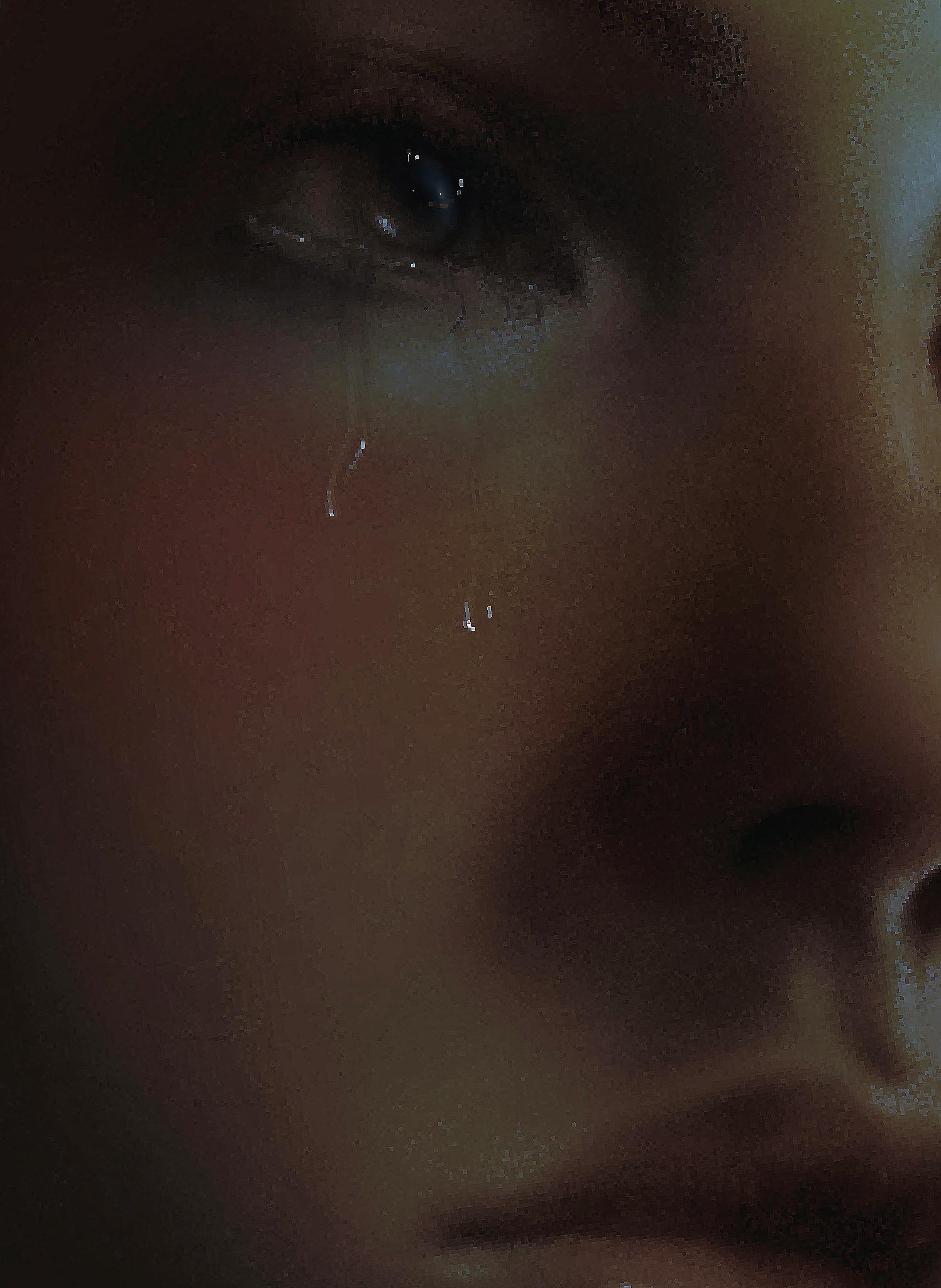
51 Literary and Art Journal
Crybaby
Amari Louviere
Child Abuse CW
always drowning in flames
the pronunciation you clawed my conscious with was jagged little slits of spit
they clung to my innocence and abandoned my freedom
how can children be born so naive when the harshness within the world will continue to jab the dagger further in their back
i didn’t know when you gi ed me a ti any and co bracelet it meant a loan that increases interest each time i hiss back
i didn’t know that turning eighteen meant a leash was taut tightly around my swollen neck
i didn’t know that ghting for myself meant drowning in a losing re
Madeline Bitzer
52 Amendment
i didn’t know i could write an entire childhood on this page
i could turn my head and feed the ames my enemy but the blood is still drying on my hands
i could cry the re away but i am dried up like a widow
i didn’t know that a gunshot echoed through the skull like the words chimed by a christmas choir
i didn’t know in a poorly wrapped gi you saw pleasure in drawing sympathy and praise like a sword out of a rock
i didn’t know you thought ‘brave’ was staying while i thought brave was leaving
i didn’t know that when the lights went out, the monster wasn’t under my bed, but in the living room on his eleventh hour of television while i barely eight at the time put myself to bed
53 Literary and Art Journal
i didn’t know in my blonde curly locks you saw the rope to lasso my heart with
i didn’t know you saw in a child another spark of happiness you could steal like the way the wind steals a ame
why the need for the birthday girl to blow out the candles when her father can do it for her
i didn’t know in each milestone you saw the cage around my growing body gain height and length as i shrunk away dimming
i didn’t know i was a failed attempt at gloat.
why raise a child when they didn’t harmonize with your shrill notes of demand and attention from the public pleasing
i didn’t know you cried fake tears to drown me drilled in the same spot
i didn’t know you saw me as a mess-up
54 Amendment
a failure a mistake towards the end
i didn’t know that a single note with three sentences on it could end a lifeline
i saw the erce ames burning at the end of the tunnel and i ran
while you stood with the gasoline in one hand and a drink in the other watching as the ames cried out slurs and ts of anger all while throwing a t stomping her feet as she blazes my fragile skin howling yowling wailing for me to burn like i deserve completing the dangerous show with one slice of heat and i crumple to the ground
then the re whooshes away alongside the man with the gasoline and drink and they get drunk o the power
someone was always drowning in ames.
55 Literary and Art Journal
inspiration is a jealousy
sometimes i wonder what my old room in chicago looks like. my bed, once slept in and wept in, now sunken within and decayed, add a thin layer of dust dirtied with tears of anger and mistreatment settled deep in their roots. my childhood oats up around the room, swells and digresses in time, like the shadow of a ghost: haunting -what could have been the dresser, once cream, now covered in sticker residue from when i was four and indestructible. inside each cabinet lay
Madeline Bitzer
56 Amendment
CW
Child Abuse
discarded items, from when i was in a rush to run away and couldn’t give those items a second thought for fear of being caught and captured. i wonder how those items feel a er being abandoned? probably similar to how i’m feeling.
-what could have been years of holiday visits, sleepovers, movie nights, my graduation, my 18th birthday, 19th birthday, 27th birthday… instead: the words
“you are the reason he cries himself to sleep every night, you are such a bitch, such an egotistical daughter, you are so sel sh” circle around the sun stale room. the countless times i looked out the window, admiring all the children playing outside in the summer breeze, while i was locked inside,
57 Literary and Art Journal
forced to deep clean the house top to bottom at the age of seven. and in a couple of hours, i would hear the familiar rumble of his car tires as he arrives home, his clunky boots as he clambers up the back porch, the hiss of the lock and the door creak as he enters the house and his stern inspection of every corner of the house, looking under chairs, in cabinets, behind the tv, as he grades my work a D minus and tells me to x my mistakes. then he whips o his muddy boots admiring the track of dirt he has le on my freshly mopped oors, lays his wood cutting and grass sweaty body onto my freshly vacuumed couch and eats chips and drinks soda while i continue what i have been doing all day. but as the chatter and fake laughter on the tv thug on, and the munch of chips and crumbs falling through the cracks of the couch, and children’s laughter and the sound of bikes being rolled past the front window,
58 Amendment
moan on, all i can hear is my pressured heartbeat that has painstakingly been beating since i rst heard those tires on the driveway. my eyes are tearing with alarm, my face is red with anger and resentment, my tongue tightens with complaints, instead, i hold back the wave rolling through my body and get to work. my hands shake from exhaustion and fear, but it’s better than being beat on with words of spite. so i clean and clean and clean. i go to bed in my dust-infected bed and wake up the next morning to the slam of the back door, the crushing sound of his overweighted tires, and the reckless tv noise with the news still on. i clamber out of bed, awaken with the idea that for the next six hours i am free, only to nd the house in disarray. red solo cups scattered everywhere from the party he hosted till two in the morning, the strange teenage boys he invited into our house as i tried to sleep and dream of a world unlike my own. my bedroom door freshly ajar from when the teenage boys snuck into my room to have a look at me, the front and back doors are both unlocked even though i am seven years old and home alone, the gallon of milk and dozen of eggs le out on the counter to spoil, the stove still lit, cooking a shriveled-up hot dog from the night before,
59 Literary and Art Journal
the mail of unpaid bills from the last several months stacked up tall on the dining room table, tools and screws and nuts and bolts sprayed along the oor for my bare feet to tiptoe over or else be amputated, and the list of chores to do that day scribbled on a piece of paper with a warning of “OR ELSE.”
i get to work, and i clean, and clean, and clean.
60 Amendment
The Imagined Grave of a Gay Granddaughter
Madeline Wade
Time melts and pools under summer sun
I change my shirt twice in one day.
Alone, my harried re ection
Caught in the bedroom mirror
I think of them, this nal call Tightening my brow.
ey will sit close in those heavy, wooden chairs, Frozen as they listen–e granddaughter they love, dead. ey’ll let the news sit in their throats, Pool in their eyes.
A gentle breeze blows o the lake She shares the blanket with me. Her gentle ngertip Tracing each knuckle. I lean in, breathe deep.
I fear when I call the tears will leak through the phone
Soaking my shirt, Frizzing my hair.
at soundless summer rain will drip through the holes In my sneakers. My skin bristles, ghting
a quiet that wants to break my bones.
61 Literary and Art Journal

62 Amendment
Spot the Difference
Jesse Beck
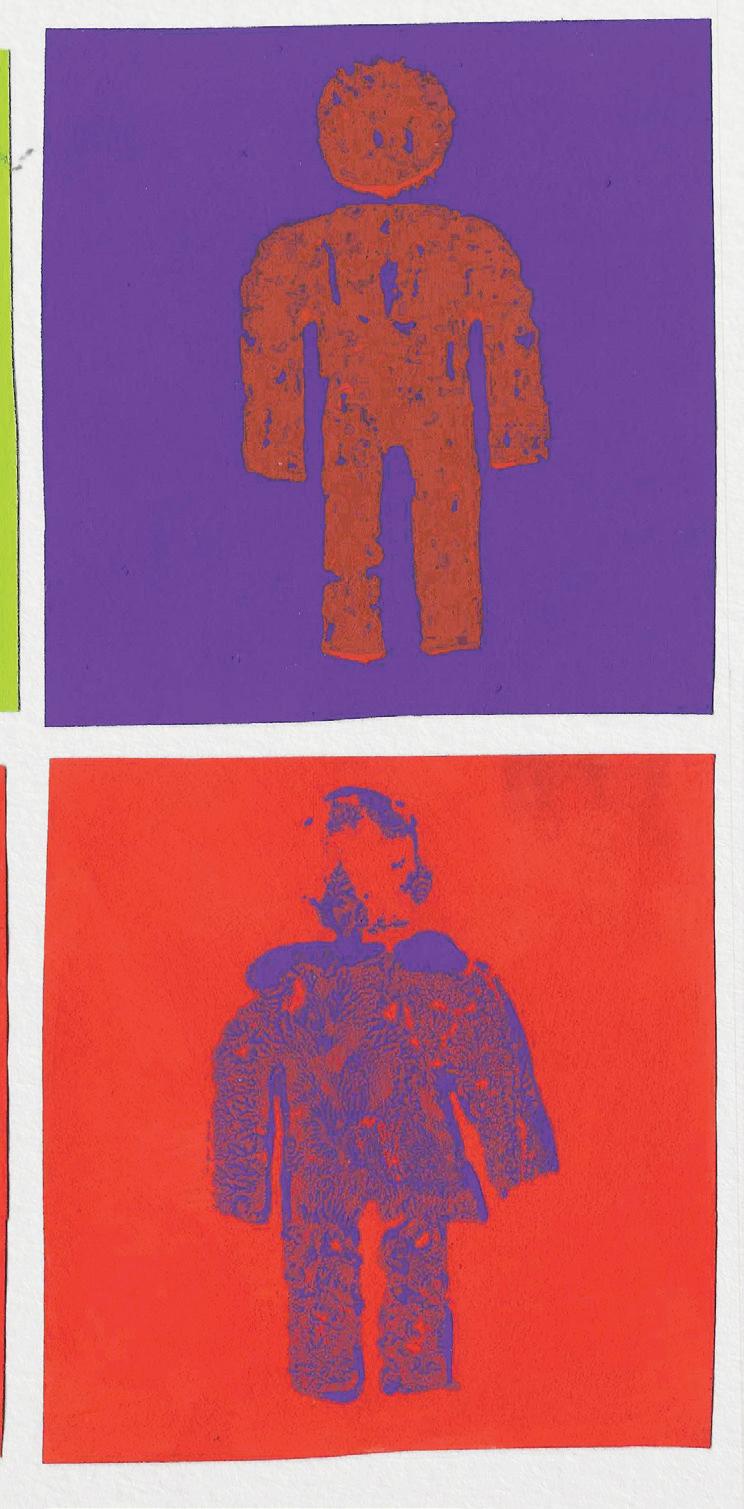
63 Literary and Art Journal
←
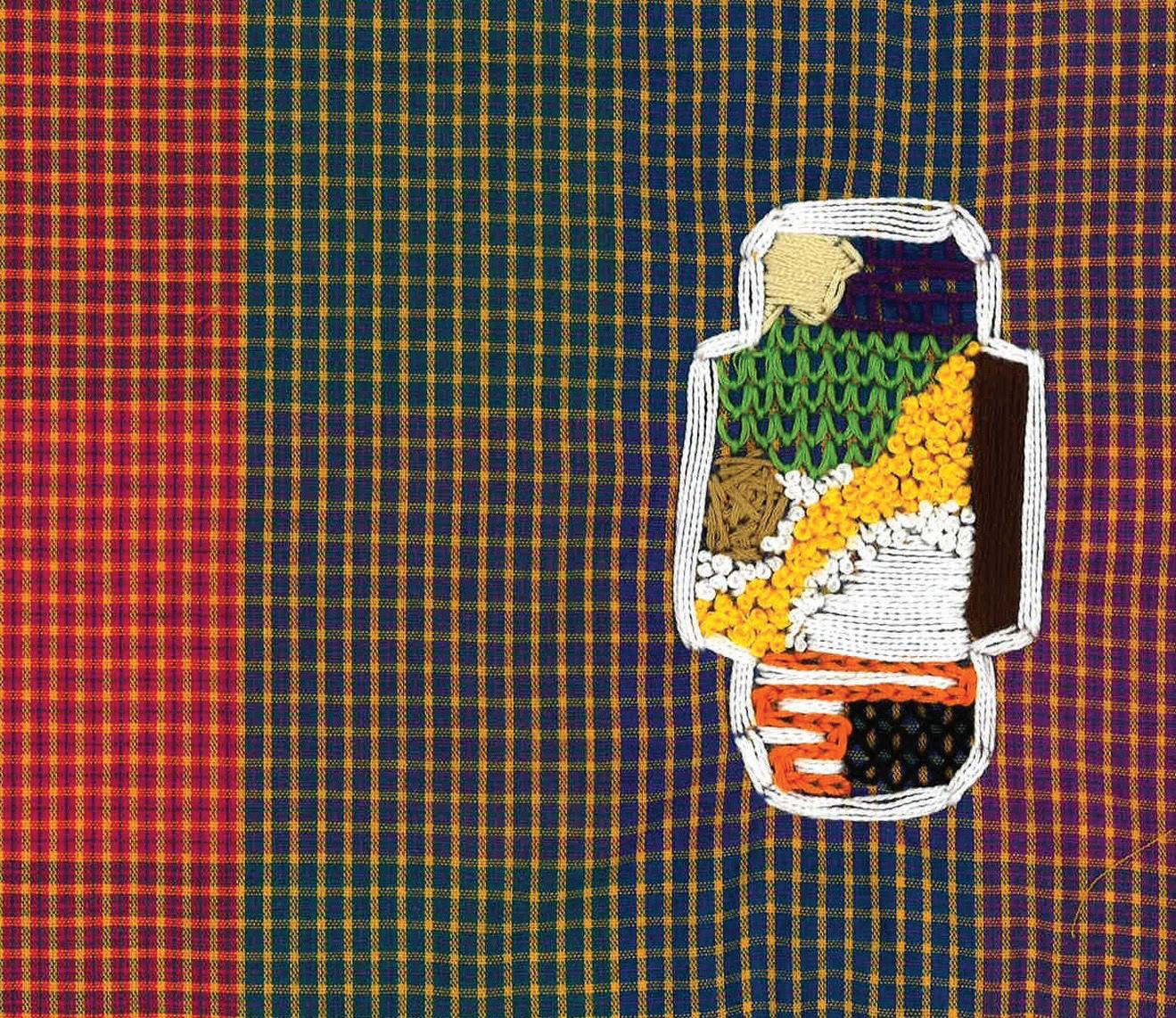
64 Amendment
Haley Salmen
For many people, feelings around their periods can vary from dysphoric, painful, refreshing, neutral or even mixed feelings. is piece highlights how people go through di erent experiences with their period, especially in the context of queer and trans people. I grew up struggling with a period. Monthly, I would struggle to get out of bed and do anything but sleep and o en was invalidated. ese experiences inspired me to make this piece.

65 Literary and Art Journal .
←
Mary Solveig Reda
I told myself I would stop writing poetry for you but that was before you told me you loved me and frankly, if that was your takeaway from the last poem I wrote, I must not be much of a poet. is time I will say what I mean. Once, in gym class, you took an elbow to the face, and I watched the blood gush over your mouth, my favorite color sticking in your teeth, and I have never wanted to kiss you more. When I was a child I turned the shower heat as high as it would go and stood until my skin burned pink, because I was already convinced I was going to hell and I thought I should practice. is is what you feel like: my hand on the handle coaxing the heat higher still.
I keep a polaroid photo of you in my desk drawer tucked beneath a memory of you laughing and calling me a dyke. What do I do with the memory of your mouth on mine? e di erence between us is this: you think this is romantic.
I’m sorry I didn’t lick the red from your teeth if only to take it from you.
66 Amendment
LIGHTPAINTERR
Model: Haley
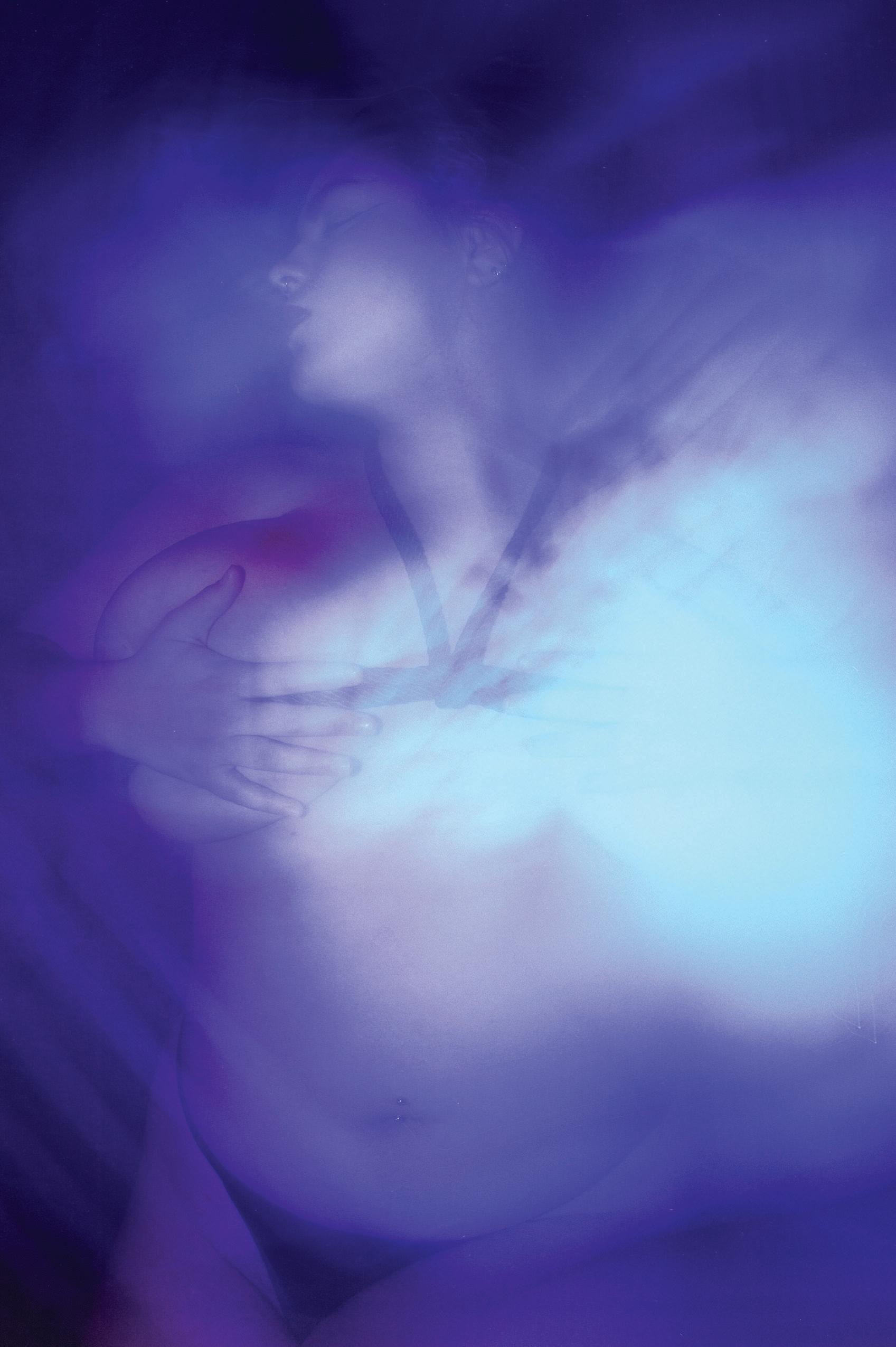
Deviance
Pride (A Change is Gonna Come)
Part I: Change
Change. A whirlwind. A sudden shi . Change. Gradual. Evolving with time. Change. To make or become di erent. Change. e act of becoming di erent. How have I changed? Have I changed? Will this change how people see me? Now there’s fear. I can’t keep it inside forever. Do I hit send? I’m tired of hiding. Doubt creeps in. A nervous hand. A shaky breath. A sweaty brow. But it’s necessary. I must, it’s time. I’ve held o long enough. Change. No more fear. No holding back. I am who I am and nothing will change that. I’ll ask again. Have I changed? is time I think yes. Emerge. Free. I’m still the same me. You just know more. Alright. Here it goes.
Change.
e dictionary says that change is when we choose to become di erent and the process we endure to get there, wherever “there” is, that place on the other side that’s better and more satisfying than the present moment, an awakening, a revelation, a realisation, an epiphany I didn’t realize I had until the days of pep rallies, football games, and class eld trips—high school, the burning question of my sexuality ringing through the ears of my classmates, a part of my coming of age story, but still I was in a cocoon detached from everyone and too afraid to be my true self until I burst, spread my wings and prepared to y, for I had become a butter y, a beautiful queer butter y.
Embracing femininity was something I welcomed. When I get ready I need all the essentials: Big hoop earrings, blush on my cheeks, glossy lips that shine, a purse to compliment each out t (who knew how great purses were!) Perfume that made me smell of vanilla and sweet dreams, scrunchies on my wrists (even though I don’t have hair), dainty necklaces, and painted nails. Realizing clothes don’t have a gender, how I presented myself was a performance, an artform, an expression of my own creativity and imagination. All of this culminated in bigger self-con dence, being unapologetic of what I liked and what I believed to be beautiful. A change did happen, a change of how I presented myself yet it was always there, just hidden away. Loud, colorful, feminine, whatever label you choose, who cares what others would say. But was that necessarily true?
68 Amendment
shawn
Being out is exhausting.
Being out is refreshing.
e backlash is too much.
I hear things like:
“I don’t agree with that lifestyle,”
e acceptance is overwhelming.
I hear things like:
“I love how happy you are now”
“I want nothing to do with him.”
“Wanna go out sometime?”
I can’t stand all eyes on me.
I love the attention. Leave me alone.
Take a picture, it lasts longer.
I should just go back into denying.
I’ll never go back to hiding who I am
I’m still the same old me
I’m the same old me, but better
“Are you gay?”
“Are you gay?”
69 Literary and Art Journal
No, but I do like boys
When I hear the phrase, “you’ve changed,” I stop and think, have I changed or has your perception of me, the idea of me that lives in your head (rent free), formulated by chance encounters and social media posts, has that changed—yes and no, more so but less so at the same time, di erent, but still the same just more con dent, more bold, more happy because I am able to walk down the street with my head held high regardless if I’m wearing baggy clothes or a crop top with some makeup on and it’s the best damn feeling in the world and it’s because of that that I am now free, so yes, maybe I have changed, but I’ve changed for the better because now I have pride.
-
Part II: Pride
So what is Pride? It seems I always have questions. Some I can answer. Some I can’t. I’ll try my best to answer this one. Pride makes me feel like I belong. To belong, to have Pride is almost euphoric. A change. Always there, but hidden. Finally. Erupting with Pride, on display for the world to see and relish. ink “Firework” by Katy Perry. “You’re gonna leave ‘em all in awe, awe, awe.” On repeat. e testimony of a glorious outcome. An anthem of Pride. Pride in my accomplishments. Oh how far I’ve come. A testament to the change I have undergone. e dignity I feel. e equality I ght for. e visibility I so deserve. Pride! Pride! Pride! Scream and shout to achieve it. I have to say it to believe it. And boy do I believe it.
Pride is meant to be a celebration, a parade, a festival, a joyous event that acknowledges the struggles and hardships it takes to get to this place, this place of belonging and acceptance that feels like an eternity to achieve, but the results are ever rewarding and it takes me back, back to my rst Pride, a day that I will cherish for the rest of my days, an everlasting whirlwind of emotions, all good mind you just so much it seemed to me like a sensory overload.
A sensory overload that brought back a memory, one so distinct I couldn’t forget it
70 Amendment No
if I tried, when I used to go over to my friend’s house and play with her dolls, dolls of all shapes, colors, and sizes, never judged because dolls are “for girls”—how I was so excited, that childish excitement that was lost for so many years, nally coming back to the light, an exciting thrill and the pure joy I felt, how we all feel joy when we get to participate in the fun, to be children, in a sense we never leave the dollhouse, that sense of Pride, happiness, joy is still there.
Makeup, check. Gems, check. Bracelets, check. Fan, check. I was there to show the world, or at least part of it, who I was, what I am, and how I feel. Now look in the mirror. Who looks back?
A doll, pretty as a Barbie with the attitude of a Brat Gender is only a performance.
e human body is a canvas. On display, vulnerable, but powerful. Change leads to Pride.
I’m ready.
e “Virginia is for Lovers” sign redecorated with the colors of the rainbow to show that Virginia was and is for all lovers. Beautiful Southern Pride. e music of Whitney Houston and Lady Gaga blasting from the speakers as it shook the park, people, young and old, dancing and singing. e families, children with their parents, parents with their children. e drag queens who grace us with their presence. What makes a queen? eir regal adornment, elegant status, compassionate atmosphere, o ering comfort, and compliments to all their subjects. What makes a queen? e tent labeled “free mom hugs” and one mom o ering to hug me, an adult but still someone’s child too. A mother’s hug is like a blanket, a safe space away from the harsh cruel realities of the real world, but a hug can also be reassuring as with every hug, we must let go, but the tenderness and protection is still there. Away from our mothers, our homes—we make our homes wherever we can with whoever we choose, our chosen family, not by blood, not by name, not by dreams or goals, but by connections and the deep emotions we feel for one another.
Camaraderie.
e acceptance that came to me was something so natural and loving that I could
71 Literary and Art Journal
only wish the same onto others. To my friends and chosen family, both blood and otherwise, we became intertwined in being loud and proud, a pack of lions willing to protect each other and those like us in our Pride. I am an advocate for every Black child who thinks they might be di erent, for every brother, sister, and sibling who chooses to live their life openly and free, to have Pride in their being, their sexuality. We form tight bonds that refuse to bend or snap with those along our journey of acceptance and self love. at’s what I’m most proud of. How I was, am, and continue to share myself with those who will listen, who love me for me. To be vulnerable in a way that allows you to take back control. Vulnerability in the ability to share the best parts of yourself with others.
So yes, that’s what Pride means to me, a product of the change I’ve gone through, years of being trapped and now I’m free. My youth and inner child are shining through into adulthood. Change is a metamorphosis we go through based on our experiences. e monarch caterpillar stays in its cocoon for eight to twelve days.
e drag queens get ready for the show, the audience cheering in anticipation.
e monarch erupts and ys. e Queens take the stage. ey’ve transformed. I’ve transformed. I’ve changed.
at girl is proud as hell, and she sure is coming out today.
72 Amendment
Waiting
Wildfire Rebirth
Kylie Love Gatchalian
I.
the strike of a match signals change.
ames sweep through the forest a deer bounds by, fur burnt, looking for a way out. meanwhile, i stand feet planted, longing to burn
could re rejuvenate the forest? stuck in the midst of a blazing wild re, hoping that destruction will snu out my yearning for rebirth
the ames grip me and turn me into ashes
II.
the land, now barren, is covered with dust. my toes dig into the dry soil i meander through what remains: charred branches, thick smoky air, and the tired earth
i kneel and kiss the ground, wishing for rain
III.
a delicate indication of spring— a rabbit hops by, button-nosed, sni ng the fresh greenery next comes a violent but marvelous outgrowth: wild owers blossom around me
so and wild, tiny tu s of lupine
sprout their way through what was once cold hardened ground. i kneel close to the soil, laughing as blades of grass so ly tickle my ngertips
i bloom with the forest’s resilience
73 Literary and Art Journal
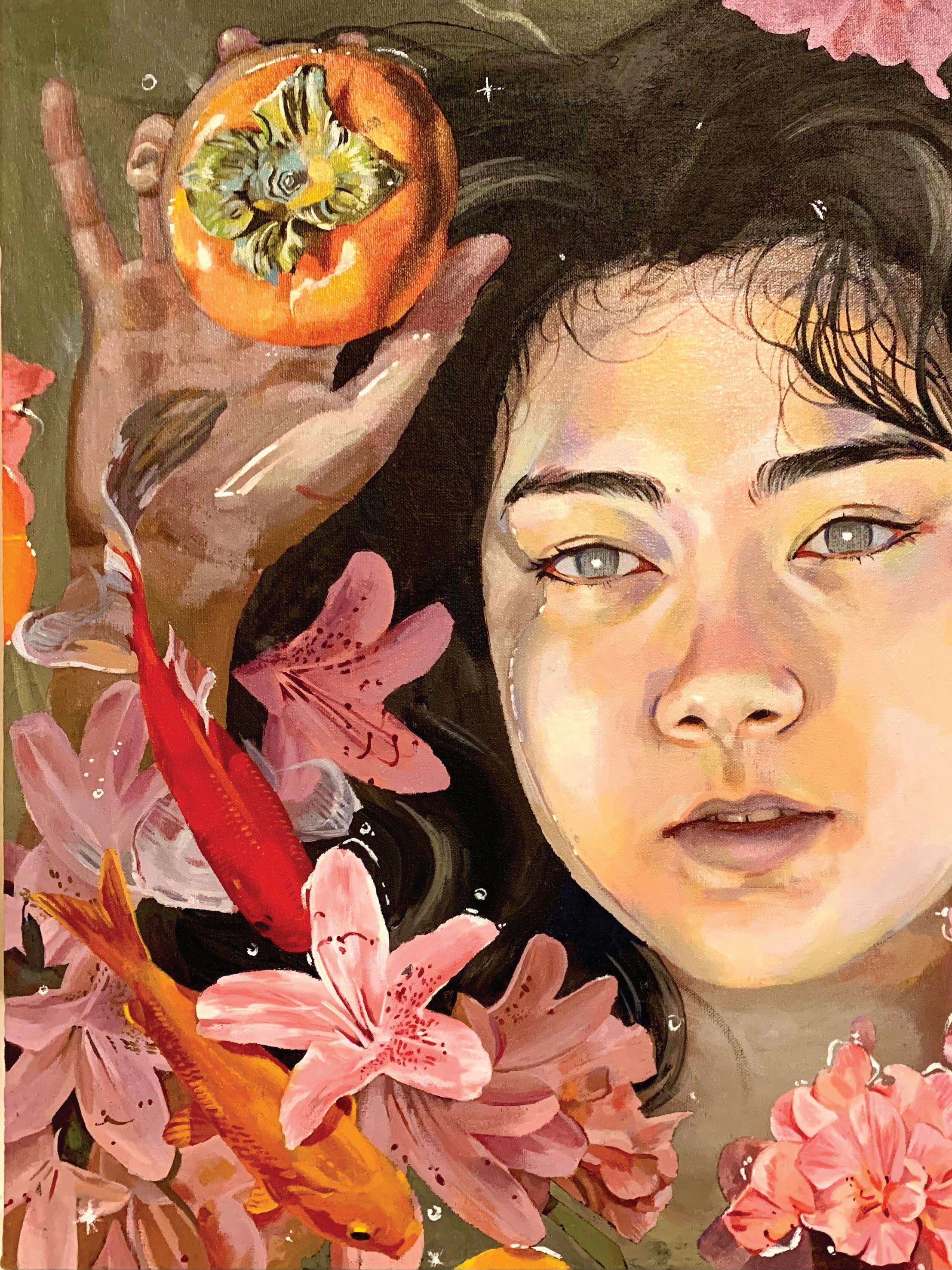
74 Amendment
The River
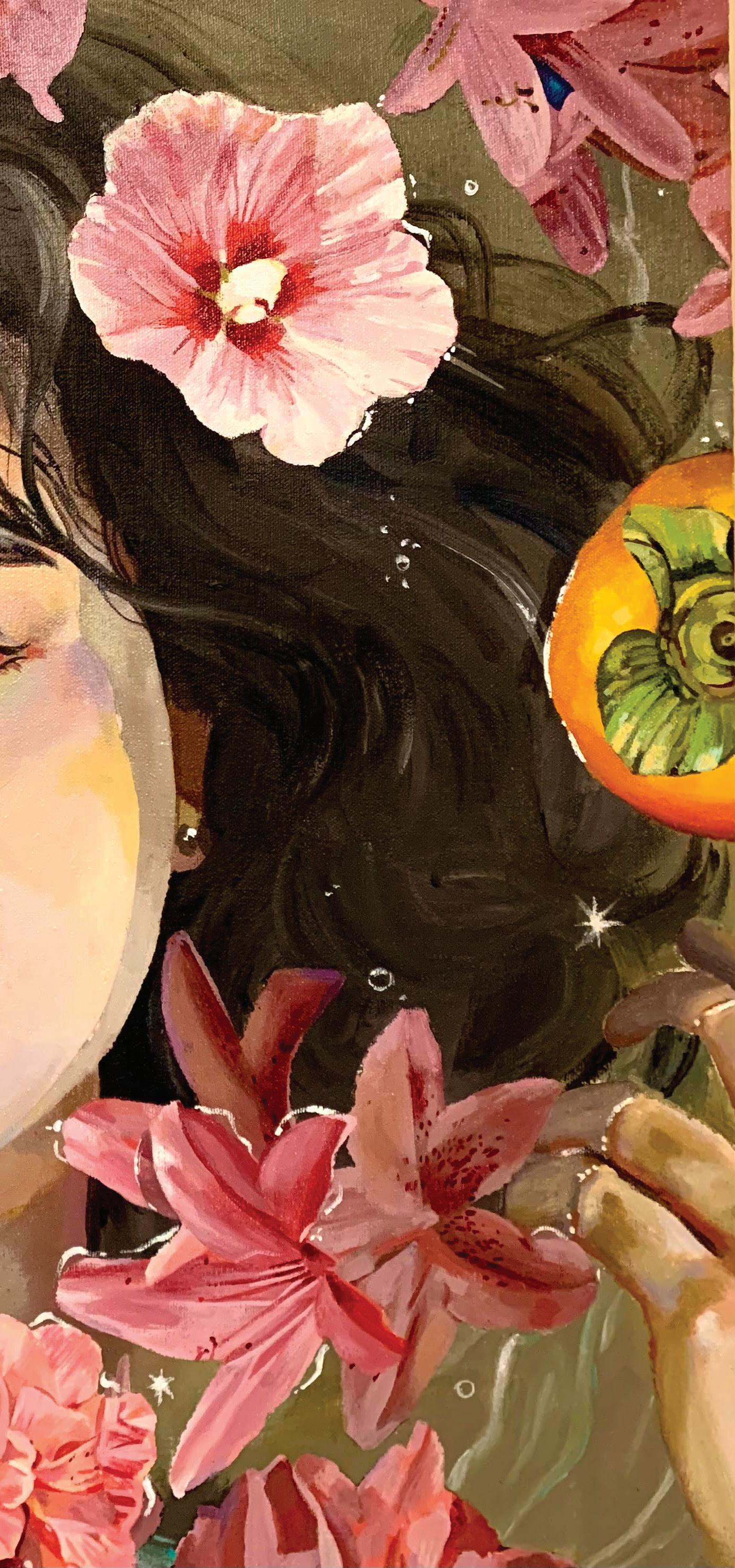
75 Literary and Art Journal
←
Hyunji da Silva
Fire on Fire on Fire
Jenn Bui
I am sweating and hot and as I walk down the city streets, heat radiating from the asphalt, I think about how my parents love the summer temperatures. I never did, in fact, I love the coolness and colors of fall and maybe I’d even go as far to say that I like the snow. Of course I do, because like all other Virginian children I would join the neighborhood kids in those winter white moments, laid in the snow tracing angels, and topped off each no-school day with a cup of hot chocolate.
When my aunt came to America, she was 32 and I was 16, and we were home together when she came up to my room to excitedly tell me it was snowing - this was her first ever snow.
My mother would complain every time the annual blizzard came around. Something about the tropical sun of Nha Trang. I never really knew how she preferred the heavy, wet air, not until I reached back into the depths of my memory and feel the hug of the Vietnam heat and maybe I still don’t necessarily get it but I get why. I only ever visited once when I was 7. My dad lived there until 20, when my grandpa had no choice but to move their family to America post-war. My mom came over when she was also 20, when she married my dad and shortly had me.
Do you ever think about how your parents have only known you for a fraction of their lives but you’ve known them for your entire life? Sometimes I think about how I have known America my entire life when it is only a fraction of theirs. Sometimes I wonder if this is the choice they would have made were their home country not poisoned in memory. Lately, my mom has forbidden me from talking to her about the news because it has become too depressing for her. Lately, we have been talking about how the American dream has failed her.
At first, I decided against performing this piece. My favorite poem I’ve ever written is about our cosmic insignificance in an infinite universe and somehow my family’s story felt too big to carry into these studios and dump into your arms. I used to love performing my writing, I used to compete in speech competitions and for some reason now the words that real life wrote were just too much.
76 Amendment
Then, I decided to maybe print it as a piece in 6pt font so the words didn’t feel as loud - used a Comic Sans-esque type and changed the color from black to make it feel a little friendlier. I added decorations to the pages and even though I originally decided to print it on 11x17, 8x11 was the biggest I could bear looking at that story in.
Clearly, I didn’t decide to present it that way. I saw my best friend for the first time in months this weekend and we reminisced about the fire on fire on fire that was our friendships with people in high school. We used to share pain the same way laughter is shared and not that we didn’t have our happy moments but when two, three fires feed off of each other eventually everything becomes engulfed. And we’re not like that anymore but maybe sometimes, for me, it still feels good to ignite parts of me into that anger at the world.
I wrote a second ending to this piece not because the first ending wasn’t real – it was all too real, it was all these intense words and metaphors and more just to say that things are hard and America sucks, all things that everyone knows.
What I need to know, what I need to tell myself is what I am writing into this new ending. It is what I am now reading rather than printing because I want all of these words in their total sadness and happiness to have an impermanence that that printed piece would have immortalized, a fleetingness in the way that emotions come and go. The world always seems to be on a steady march towards the bad and the ugly and my cynicism observes this but the cynic fails to remember the joys of the world that is to be celebrated.
So this is me doing that in these words – this is me laying that short story in your arms of how disenchanted my mother’s become with the country that took us in and I’d be lying to say it doesn’t continue to be hard, but now this is me assuring you that last summer, I brought a barn kitten home as a surprise for my sister and even though my mom was mad at me, we named her Miso and she reminds her of the pets she had running around her family’s farm when she was 17. This is me telling you that even though the first part of this writing was edging towards a melancholy, there is so much that has gotten better that stands outside of our experience of Western institutions – and that’s the hope isn’t it? It’s that the fire inside of me diminishes at the breath of a boy I met two years ago and the flames around all of us are not burning so much that we are suffocating because we can still see over the embers and like all humans who came before us, we will learn to harness the fire.
77 Literary and Art Journal
Amendment accepts submissions from VCU students during the summer and fall semesters. For more information on how and when to submit, check out amendmentvcu.com, @amendmentvcu on Instagram and Twitter, or email us at amendmentvcu@gmail.com.
We are located in the Student Media Center at 817 W. Broad Street, Richmond VA.
Amendment is a proud member of the VCU Student Media Center.
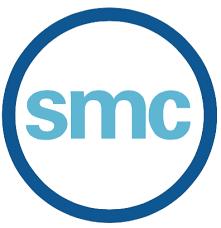
VCU Student Media Center
817 W Broad Street Richmond, Va. 23284
Amendment 2022 was typeset in Garamond Premiere Pro and Nitti Typewriter.
Printed on 100# White Lynx Ultra Smooth
Opaque Cover and 100# Bright White Finch
Opaque Smooth Text
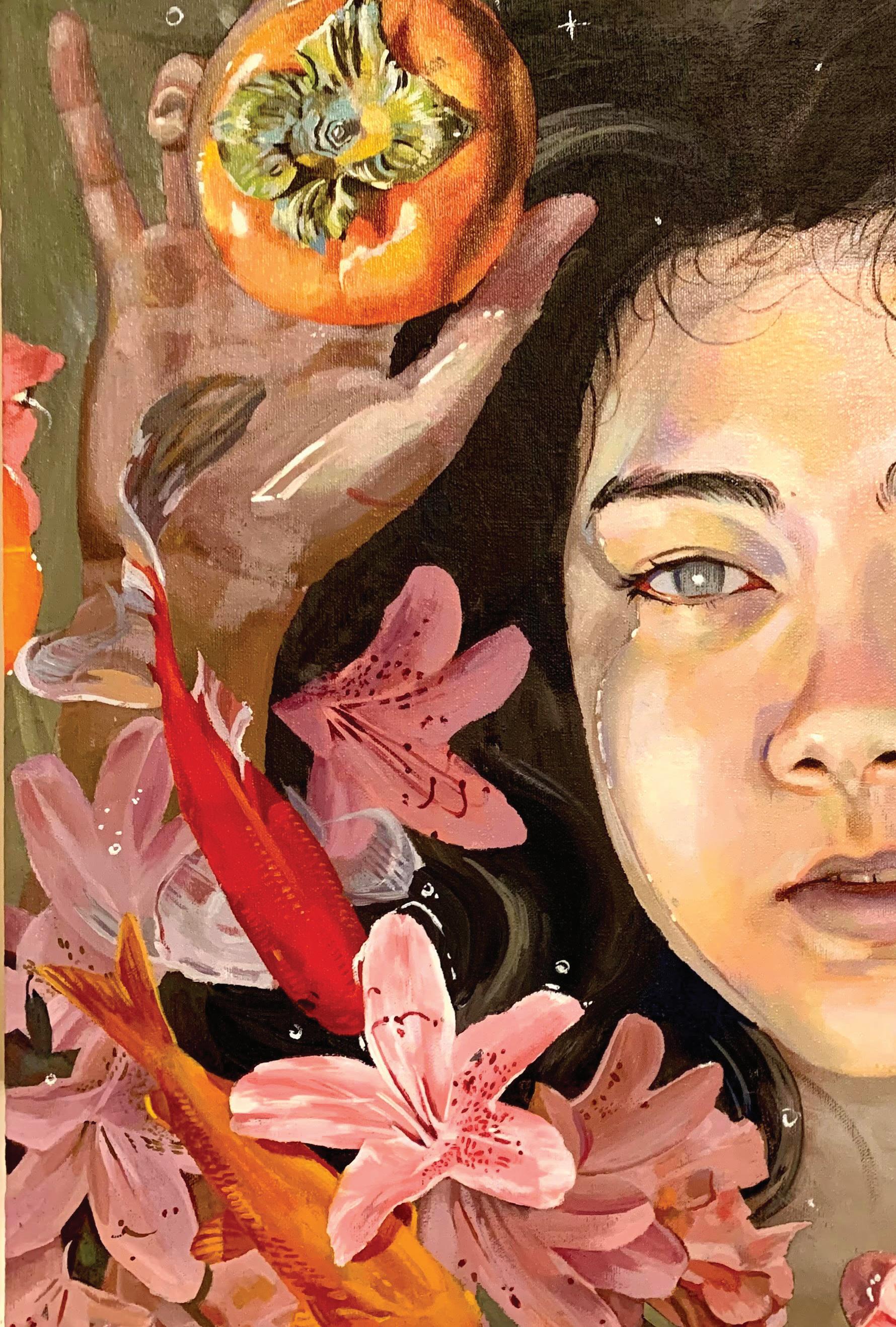












 Sirena Pearl
Sirena Pearl
















